MOSAIC
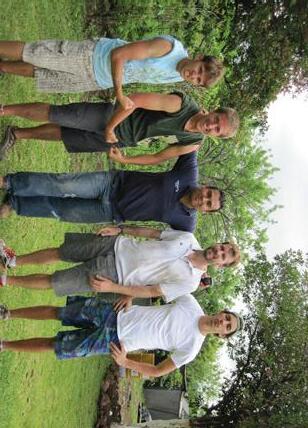







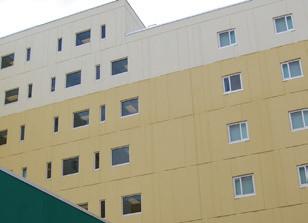




YEARS OF HONORS


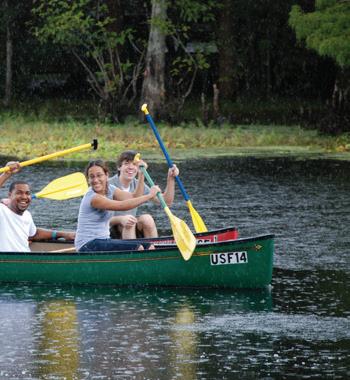



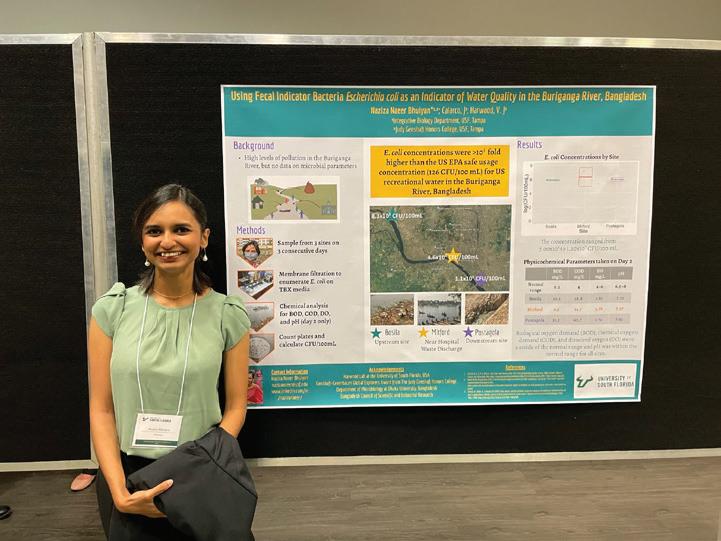
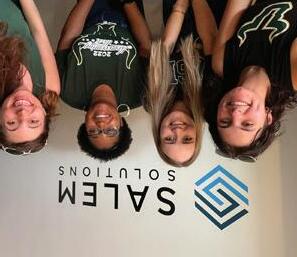
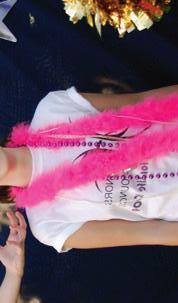








THE ANNUAL MAGAZINE OF THE UNIVERSITY OF SOUTH FLORIDA
JUDY GENSHAFT HONORS COLLEGE
2023
The Mosaic magazine is a publication of the University of South Florida Judy Genshaft Honors College. The name Mosaic was selected for our inaugural issue in 2018, inspired by the mosaic tile mural that hangs in the Allen Building, current home of the Honors College on the Tampa campus, created by alumna Sarina Masso Maldonado, Class of ‘18. The concept of a mosaic represents the Honors College experience – our community, together as a whole, is greater than the sum of its parts. Mosiac issues are published each spring, representing the previous calendar year.

Editor, Cayla Lanier
Editorial Board
Charles Adams
Megan Braunstein
Lauren Chambers
Lindy Davidson
Renea Forde
Hayden Mitchell
Audra Santerre
Dana Taylor
Catherine Wilkins
Benjamin Young
Designer, Anne Scott
Contact:
University of South Florida
Judy Genshaft Honors College
4202 East Fowler Ave., HON 1001 Tampa, FL 33620 contactus@honors.usf.edu
2 UNIVERSITY of SOUTH FLORIDA
Judy Genshaft Honors College
Photo: Built in 1904, the historic Snell House is home to Honors College students on USF’s St. Pete campus. Photographer: Laura Lyon
2023 MOSAIC CONTENTS
4 Notes from College Leadership Hear from Dean Adams, President Emerita Genshaft, and Student Council President Naziza Naeer Bhuiyan
8 Honorable Mentions Updates and accolades from around the College
14 Honors by the Numbers
Some fast facts about the Judy Genshaft Honors College
16 In their Own Words
Student submissions tell the Honors story in their own words
24 History in the Making
Looking back on 40 years of Honors at USF and reflecting forward to the next 40 years
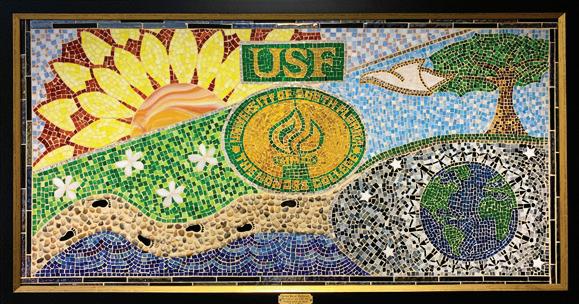
30 Building a Future Students use the new Honors building as a classroom…while it’s still under construction
46 Signature Events
A brief look inside some of our favorite events and traditions
48 New Name, Continued Success for the Office of National Scholars
How a small change in a name can open doors for greater student success
50 A Legacy of Achievement
A Provost’s Scholars Program student interviews Dr. Ralph Wilcox
52 Going Abroad
Updates from Honors study abroad programs that ventured around the world
62 International Photo Competition
View the top ten images from our annual student-run photo competition
66 Alumni Updates
Catch up on what our alums are doing in their post-college lives

69 Honors Directory
70 2022 Course Listing
Check out all of the amazing courses we offered in the last calendar year
74 Admissions Information
Interested in joining the Judy Genshaft Honors College?
44 Donor Spotlight: Richard and Jule Salem Filling the gap in disability research through a funded Grand Challenge competition
JUDY GENSHAFT HONORS COLLEGE 3
learning and community service in action
32 Community Connections Experiential
that
inside and outside
36 Honors Teaching and Advising Honors faculty and advisors describe the connections
form
the classroom
A LETTER FROM THE DEAN

WELCOME TO MOSAIC 2023, a review of life in the Judy Genshaft Honors College in 2022! The 2022-23 academic year marks two very important milestones for the college: the fortieth anniversary of the establishment of an honors program at USF, and the twentieth anniversary of President Genshaft’s visionary decision to turn the program into a free-standing honors college under the direction of our founding dean, Dr. Stuart Silverman. The college has grown and changed tremendously over the years, from its initial class of twenty students in Tampa to a dynamic college of 2,700 with a presence on all three of our USF campuses. And what better way to celebrate our growth than to welcome the entering class of 2023 to our spectacular new five-story 85,000 sq. ft. home in the center of the Tampa campus, surely the finest honors facility in the nation?! The stories in this year’s Mosaic remind us of the abiding values that have shaped the college through all the changes. You’ll find here inspiring stories of cutting-edge research by students and faculty, innovative courses and programming, selfless public service, and transformative international experiences. And year after year our alumni impress me deeply by their commitment to carrying our values forward into their lives and careers.
Woven through these stories are two convictions shared across our Honors community on the Tampa, St. Petersburg, and Sarasota campuses. One is that knowledge and action are inextricable – that the classroom and the community must be connected for both to realize their full potential, and that each informs and enhances the other. You will find here remarkable stories of students, faculty, and advisors seeking ways to translate the knowledge and insights gained around the seminar table into projects that benefit communities in Tampa Bay and across the world. Those projects in turn yield invaluable experience to bring back to the classroom to spark new knowledge and insights. This virtuous cycle is education at its best and most meaningful.
The power of this “knowledge in action” cycle depends on the second conviction threaded through this Mosaic: that complex challenges in the classroom or in the community are best addressed through dialogue and collaboration among students and mentors representing diverse perspectives and skill sets. The Judy Genshaft Honors College enrolls students from every major offered at USF, and one of our most important contributions to their education is the understanding that no single field of expertise is able to grapple fully with the interconnected nature of twenty-first century problems. In our classrooms and in communities near and far, our students learn the power of teamwork and cooperation among individuals from varying backgrounds and with different disciplinary knowledge, all focused on a common challenge.
Our new home in Tampa will greatly enhance our ability to cooperate across disciplinary boundaries. This stunning testament to academic excellence at USF will be a beehive of intellectual exchange and collaborative learning/doing. Our core values have shaped the building throughout the design and construction process, and we cannot wait to see our students to fill it with ideas and projects that give form and life to those values. The possibilities are limited only by the creativity of our students and their mentors –which is to say, they are limitless!
Charles adams
Judy Genshaft Endowed Dean
Judy Genshaft Honors College, University of South Florida
4 UNIVERSITY of SOUTH FLORIDA
A NOTE FROM PRESIDENT EMERITA JUDY GENSHAFT
IHOPE THAT YOU ENJOY reading this 2023 edition of Mosaic ! I am so proud of the accomplishments of the students, faculty, staff, and alumni of the Judy Genshaft Honors College on all three USF campuses. My commitment to academic excellence has motivated me throughout my career, and the college that bears my name is the crowning expression of that passion. As President of USF, I created the Honors College, and my husband Steven and I have nurtured its growth with pride and delight. It is so meaningful to us to have made possible the construction of the college’s beautiful new home on the USF Tampa campus, and to know that future generations of high-ability USF students will call it their academic home. The opportunities that the college offers for personal and professional growth are boundless, and we cannot wait to see what the next chapter of its history brings. Go Bulls!

JUDY GENSHAFT HONORS COLLEGE 5
THE STUDENT COUNCIL PRESIDENT’S PERSPECTIVE
IT’S NEVER EASY TO START A NEW PHASE of your life. It wasn’t easy for me to move 8,000 miles from Bangladesh to Tampa, and it can’t be easy even if college is just eight miles down the street. However, becoming part of the USF Judy Genshaft Honors College was the best decision I made when starting my college journey.
I found my community through the Judy Genshaft Honors College Student Council (JGHCSC), which I joined in my very first year. It can be daunting to put yourself out there, but I found a sense of purpose in being a part of something bigger than myself. Throughout the years, I served as the Co-Chair of the Volunteer Committee, Community & Leadership Coordinator, and finally, President. With other council members, I gained experience volunteering within the Tampa Bay area, networking with community partners and faculty and staff of the Honors College, coordinating events, working with people from different backgrounds, facilitating discussions, and finally, leading. This is the place where I gained confidence in my abilities and grew as a leader. More importantly, this is where I met people I know will be my lifelong friends and mentors. During my time here, I’ve witnessed how hard our advisors and professors work for their students, and how much they care for our well-being. I encourage all new students to get involved in something they enjoy, and to find mentors to guide them along the way.
The JGHC offers a multitude of scholarships and study abroad opportunities that urge students to explore their interests and passions, which helps to figure out your ultimate goals in life. Study abroad is a cornerstone of the college, for purposes ranging from service to education to research. I had the unique opportunity to use my study abroad experience to conduct research in my home country, which made me realize my passions lie in water conservation. As a recipient of the Genshaft-Greenbaum Global Explorer Award, I was able to investigate the extent of fecal pollution of the Buriganga River in Bangladesh, under the guidance of the Harwood Lab. I will always be grateful for this experience because I got to use the knowledge I acquired here to address issues prevalent in Bangladesh.
Like me, each of you brings a unique perspective to the Honors College — an amalgamation of your lived experiences, your background, your thoughts, your identity. I know I had never felt more pride and joy during my college experience than when I stood on stage during Honors Convocation clad in my traditional Bangladeshi sari, being so unapologetically me, and delivered words of encouragement to the new class of freshmen as the first international student President of the JGHCSC. If I could leave you with just one piece of advice, it would be to stay true to your roots and own who you are. That individuality is what makes you so special and contributes to the special culture of our Judy Genshaft Honors College.
This issue of the Mosaic features stories written by many of my student colleagues, sharing their own Honors experience. I hope you enjoy reading their perspectives, how they have expanded their horizons and intellectual capacity through all the interdisciplinary courses, experienced new cultures through traveling abroad, grown professionally and personally through leadership opportunities, and made the best memories with the best people you’ll find. No matter how far we travelled to get here, we’re all lucky to call the Judy Genshaft Honors College home!
Class
Cell and Molecular Biology Major
Environmental Science and Policy & Biomedical Anthropology Minor
6 UNIVERSITY of SOUTH FLORIDA
“
It can be daunting to put yourself out there, but I found a sense of purpose in being a part of something bigger than myself.”
Naziza Naeer BhuiyaN,
of ‘23

JUDY GENSHAFT HONORS COLLEGE 7
Honorable Mentions
Dr. Thomas Smith, Associate Dean on the St. Petersburg campus, and Dr. Catherine Wilkins, Associate Professor of Instruction, were awarded a Pinellas County Partnership in Research and Creative Scholarship Grant to develop an Arts for Alzheimer’s program in collaboration with the James Museum of Western and Wildlife Art. Your dedication to community engagement is an inspiration!

“I ran my first ever half marathon in Salt Lake City this September!”

“After 5 years of a wonderful relationship together, my partner and I are now engaged! We plan to marry near the end of 2023.”
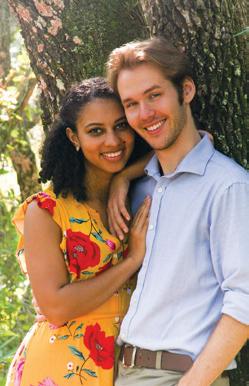
– Tanner Lansdale, JGHC Records Coordinator and Honors Class of ‘19
– Madison Glenn, Political Science and Economics
“In December 2021, I graduated with a Ph.D. in Communication from USF. My dissertation, entitled Narratives of Success: How Honors College Newcomers Frame the Entrance to College, drew on interviews with JGHC freshmen and

identified the ways in which new honors students negotiate and sustain their identities as Honors College students. Once an Honors student, always an Honors student!”
– Dr. Cayla Lanier, Assistant Dean, Sarasota-Manatee campus and Honors Class of ‘03
Kayla Long, Biomedical Sciences, and Osose Emuan, Biomedical Sciences, published a paper with Dr. Pathak, Associate Dean, and Dr. Sneed, Dean of Taneja College of Pharmacy, in the International Journal of Multidisciplinary Research and Publications. The paper is on the subject of stigma derived morbidity in the context of HIV and is a literature review from 1981 to present that simultaneously proposes a framework for the future of HIV research and care. Congrats, Kayla and Osose!
8 UNIVERSITY of SOUTH FLORIDA
Lansdale
Smith and Wilkins
Glenn
Lanier
“In summer 2022, I received the Genshaft Greenbaum Global Explorer Award (GGGEA) and I was able to travel to Hyderabad, India to intern at Shaheen Women’s Resource and Welfare Association. While there, I hosted a menstrual

health workshop, translated survivor case reports, and assisted in community workshops for survivors of violence.”
– Neha Dantuluri, Biomedical Sciences and Health Informatics
Dr. Ulluminair Salim, Associate Professor of Instruction, earned the 2021 Provost’s Outstanding Undergraduate Teaching Award, which recognizes excellence, innovation, and effectiveness in teaching in undergraduate programs at the University of South Florida. Dr. Holly Donahue Singh, Associate Professor of Instruction, earned the 2022 Provost’s Outstanding Undergraduate Teaching Award. Both of these award-winning faculty consistently integrate their personal passions and academic research into creative courses that capture students’ interests and challenge the ways in which we think about our communities, and ourselves. Our students are so lucky to learn from these two amazing scholars and teachers.

“I battled rain, wind, and 45 degree temps to complete my third half marathon in November! I’m planning for number four in Italy in 2023!”

– Allyson Cousino, Honors Advisor and Honors Foundations Director
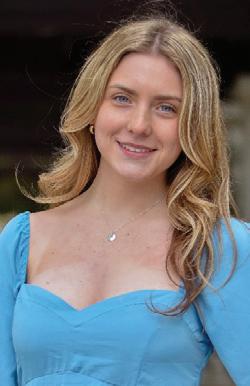
Jessica Malanga, Accounting, serves USF as a Student Government Senator and was recently awarded the Zeta Tau Alpha Foundation Achievement Award for her achievements in the areas of scholastic achievement, campus involvement, leadership, and dedication to organizational values of humility, leadership, and lifelong learning. You make us proud, Jessica!
Nana Tuntiya, Honors Affiliate Faculty, received the College of Arts and Sciences Liberal Arts Teaching Award and was interviewed on the impact of the pandemic on education and mental health for a podcast hosted by the Pasco County Public Schools’ District Office. In addition, her photo essay “Everyday Environmentalism in Europe” came out in Contexts
JUDY GENSHAFT HONORS COLLEGE 9
HONORABLE MENTIONS
Dantuluri
Cousino
Malanga
Salim and Provost Wilcox
“I presented my research “Analyzing Advice-Giving Strategies in Corporate Women’s Narratives” at the ABC Annual International Conference in Tampa. The study examined strategies of advice-giving and how advice is organized, constituted, and made up of leadership discourse. The strategies showed how authors organize credibility, identification, authority, inclusiveness, and closeness toward their readers.”
– Dr. Amaly Santiago, Honors Affiliate Faculty
Rhea Law. In addition, he was recently appointed to the new City of Tampa Mayor’s Asian American and Pacific Islanders Advisory Council. Thank you for sharing your passions with our campus and local community, Kevin!
Dr. Andrew Hargrove has published four papers in 2022! We’re so proud of his contributions in and outside of the classroom.
Environment, Development, and Water
Narratives of Environmentalism
Governing Trade: A CrossNational Study of Governance, Trade, and CO2 Emissions
Gender-Mainstreaming, Governance, and the Environment: An Analysis of Forest Loss
Honors Advisor Kevin Lee is the Founder and Chair of USF’s APIDA Presidential Advisory Committee, a university-wide committee that report issues of relevance to USF’s diverse community to President


Rachel Kline was accepted to USF’s College of Nursing and participated in their inaugural White Coat Ceremony. Rachel also recently published a paper entitled, “Homeland Security in a Clinical Setting,” in The Macksey Journal published by Johns Hopkins University. Congratulations, Rachel!

Krysta Banke, Honors Advisor, completed a doctorate in English and a graduate certificate in health and wellness coaching. She reports that she draws on motivation and productivity theories and coaching practices when advising students. Congratulations, Dr. Banke!
Arnie Mejias, Director of Advising, Dr. Donna Gambino, Honors Affiliate Faculty, and Dr. Lindy Davidson, Associate Dean, supported students for a publication of their capstone research titled “Positively waiting: Technology as the preferred distractor in a pediatric outpatient setting” in the Patient Experience Journal Your support of our students is vital to their academic growth – thank you!

10 UNIVERSITY of SOUTH FLORIDA
Santiago
Lee
Kline
Volunteers from the JGHC Student Council built Corsi-Rosenthal box filters designed to increase air filtration for better air quality in the classrooms in the Allen Building in Tampa. The JGHC funded this initiative based on
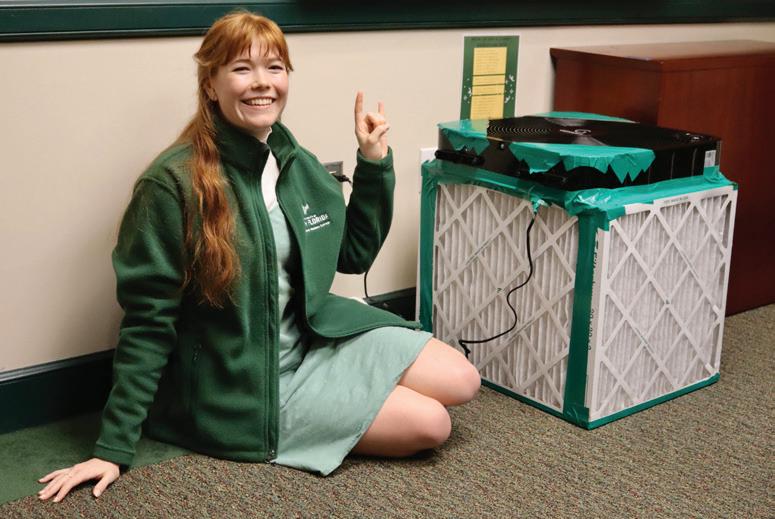
research demonstrating their ability to reduce airborne pollutants, including virus particles. We want to thank our Student Council members for assembling these boxes to help improve air quality for all of our students.
HONORABLE MENTIONS
year and was honored in early 2022. Honors Advising is a keystone to the honors student experience, providing one-onone attention and personalized care. We’re thrilled that Krysta, Dani, and Kevin were recognized as outstanding amongst their peers!
“This year we took action on two sustainable practices at home: adding solar panels to our roof and planting a food garden in our front yard.”

-Dr. Andrew Hargrove, Assistant Professor of Instruction
Dr. Krysta Banke and Dani Soluna, Honors Advisors, were selected to receive
the 2022 Outstanding Undergraduate Advising Award for exemplary undergraduate advising that directly impacts student success. Kevin Lee received the award for the 2021
“I was recognized with a Global Excellence Award by USF World. The award was presented by President Rhea Law and Interim Provost and Executive Vice President Eric Eisenberg. The Global Excellence Award recognizes the remarkable work of USF faculty, staff, administrators, and university organizations as together we raise the global reputation of the University of South Florida.”
– Nazek Jawad, Honors Affiliate Faculty and Learning and Development Specialist in the High Impact Practices and Undergraduate Research (HIPUR) Office
“My book, Infertility in a Crowded Country: Hiding Reproduction in India, was officially released by Indiana University Press in December 2022. Honors alums Yesha Shukla and Sarah Lendavay read drafts of the manuscript and helped with brainstorming the images and glossary. The JGHC provided support for creating the book’s index and for me to present aspects of the work at national and international conferences (in Vancouver, Canada; Hyderabad, India; and Washington, DC) over several years. The scholarship featured in the book grounds several classes I teach in the JGHC, such as IDH 3400 Fertility and the Future, IDH 3400 Global Health with People First, IDH 4950 Reproductive Health, Rights, and Justice, and IDH 4200 Healing and Everyday Crises in South Asia.”

– Dr. Holly Donahue Singh, Associate Professor of Instruction

JUDY GENSHAFT HONORS COLLEGE 11
Corsi-Rosenthal Box Filter
Longtime Honors Affiliate Faculty member Dr. David Jenkins was recognized by the Creative Loafing magazine Best of the Bay Awards with the Best Stage Director Award. In addition, his company, Jobsite Theater (resident theater at the Straz Center), was recognized as the Best
Professional Theater. Their recent production of The Resistible Rise of Arturo Ui, pictured, was named Best Gesamtkunstwerk in the Creative Loafing Best of the Bay Awards. Dr. Jenkins shares his talents with Honors students in several Honors courses focused on performance and identity.

Two Honors students received the USF Undergraduate Research Scholar Award in 2022, which recognizes a student’s commitment to development as a researcher during their undergraduate tenure:
Jessica O’Reilly, Communication Science and Disorders
Shanon Rego, Cell and Molecular Biology
Braunstein, Lee, Roberts, and Chambers
Several Honors staff members were recognized at the 2022 USF World Global Excellence Awards Breakfast. Megan Braunstein, Lauren Roberts, and Lauren Chambers received Certificates of Global Contribution for serving as Global College Stewards. Kevin Lee received recognition as
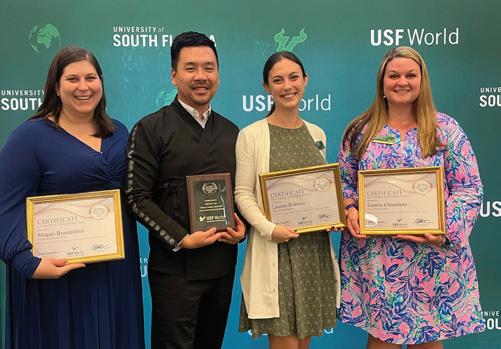
an Early Adopter of the Global Virtual Exchange Program for his Spring 2022 virtual exchange course on South Korea. These staff members embody our values of engaged citizenship in our global community, and work tirelessly to create exceptional learning opportunities for our students.
Undergraduate Research Conference Awards
Each year the Office of High Impact Practices and Undergraduate Research hosts an Undergraduate Research Conference featuring hundreds of faculty-mentored research projects and posters. Several JGHC students were recognized with awards at the 2022 Conference.

Audience Choice Award Sarasota-Manatee Research Showcase
Honorable Mention: Angela Perez-Cruz – Psychology, College of Arts and Sciences
Title: How Poor Self-Perception Feeds into Harmful SelfHandicapping Behaviors
Audience Choice Award Tampa Research Showcase
Honorable Mention: Rachel Washburn – Microbiology, College of Arts and Sciences
Title: A Structure and Function Analysis of the RNA Polymerase Delta Subunit in Staphylococcus Aureus
OneUSF General Disciplinary Awards - Health Sciences
Rachel Kline – Nursing, College of Nursing
Title: Homeland Security in a Clinical Setting
Honorable Mention: Vrunda Patel – Biomedical Sciences, College of Arts and Sciences
Title: Creating Eye Health Awareness in Students: Developing a Teaching Curriculum and Educating Elementary School Children
OneUSF General Disciplinary Awards –Interdisciplinary
Nidhi Bangalore –Psychology, College of Arts and Sciences and Lina Elessawy – Cell and Molecular Biology, College of Arts and Sciences
Title: Novel L-Ergothioneine Treatments with Antioxidant/ Anti Inflammatory Effects Improve Hearing in Geriatric Male Mice in CBA/CaJ Mice
12 UNIVERSITY of SOUTH FLORIDA
Jobsite Theatre
Perez-Cruz
Honors Affiliate Faculty member Tamara Nemirovsky served as Grand Juror of the Gasparilla International Film Festival 2022, alongside Andres Castillo, Programming Director for the HBO New York Latino Film Festival. Nemirovsky teaches Honors courses about film-making and video editing.
OFFICE OF NATIONAL SCHOLARS (ONS)
NATIONAL SCHOLARSHIP RECIPIENTS 2021-2022
HONORABLE MENTIONS
German Academic Exchange (DAAD) Research Internships in Science and Engineering (RISE)
Utkarsh Mishra
Fulbright U.S. Student Program
Glenda Vaillant Cruz
Gabriela Cuevas
John Robert Lewis Rising Leaders Scholars and Fellows Program
Vaidehi Persad
Benjamin A. Gilman International Scholarship
SPRING 2022
William Ankers
Courtney (Niav) Atkinson
Daelyn Quinn, Cell and Molecular Biology, published a paper entitled “End-of-Life Decision-Making in the Context of Mature Minors with the Support of Pediatric Palliative Care,” in the Richard Macksey Journal, an undergraduate humanities journal published by Johns Hopkins University. This paper was originally developed in Dr. Davidson’s End of Life class and presented at the USF Humanities Institute Research Conference.
Harvard-Kennedy Public Policy and Leadership Conference
(PPLC)
Vaidehi Persad
Benjamin A. Gilman International Scholarship
FALL 2021
Falak Abbasakoor
Vianka Acevedo
Faidat Agebaje
Marycarmen Andruskiewicz
William Chastain
Emma Cimperman
Jaden Crute
Samarie Diaz
Nia’Symone Francisco
Nicole Giboyeaux
Brittany Hector
Adnan Indawala
Bianca Ingelido
Dylanis Lopez Ruiz
Yoel Gebrai
Sarah Glaser
Sarah Harder
Stephan Hassam
Margaret Maliwat
Kylie Pontious
Sydni Schlosser
Dove Wimbish
PBK Key Into Public Service Scholarship
Vaidehi Persad
Florida Gubernatorial Fellows Program
Keerthana Kallarackal
Barry M. Goldwater Scholarship
Cole Gibson
Caitlyn Coleman
Alexandria Brady-Mine
Alanea Bader
Makenna Bader
Taylor Binger
Laura Chonqui
Mandy Chuor
Bianca Cole
Katherine Colon
Shannon Cousineau
Nicolle De Hoyos Uribe
Silvia Diaz
Binh Duong
Jessica Eady
Alyssa Eman
Keven Espinet-Pizarro
Lisanny Estevez
Barbera Guraj
Mia Hawthorne
Gabrielle Henry
Talia Hoffman
Sabrina Joval
Seline Kaboudan
Natasha Khitlik
Aiden Jaskolka-Brown, Biomedical Sciences, published his paper, “Haitians in the Dominican Republic: Marginalization and its Relationship with Public Health,” in the Richard Macksey Journal. This paper evolved out of the Freshman Thesis he wrote in Acquisition of Knowledge, with guidance from Dr. Davidson, who co-leads the Judy Genshaft Honors College service trip to the Dominican Republic.
Bella Mollentze
Audra Nikolajski
Zena Omer
Adesola Orogade
Virginia Perez
Ferlynn Petit-Bel
Penelope Schweitzer
Fayroza Shalash
Jasmine Soto
Jakai Wade
Jennifer White
Kacey Wood
Evan Worden
Public Policy and International Affairs Program (PPIA) Junior Summer Institute
Vaidehi Persad
Ernest F. Hollings Scholarship
Abigail Reed
Danya Awshah
National Science Foundation
Graduate Research Fellowship
Emily Carr
Patrick Collard
Fasika Hailu
Daniel Halbiesen
Adriana Ladera
Kelli Lynch
National Science Foundation
Graduate Research Fellowship
Honorable Mention
Rosemary Castro
Boren Fellowship
Yoel Gebrai
Victoria Lim
Jennifer Lukowski
Zhani Lyn
Victoria Mercado-Lues
Joanne Neston
Philip Okonkwo
Yelianys Remedio
Karen Rodriguez
Alana Sandy
Olivia Schenkman
Mariell Surin
Yasmine Taylor
Robyn Thomas
Michelle Velez
Ariel Wallace
Michelle Warren
Senya Wickramaarachchi
Caitlin Wunsch
JUDY GENSHAFT HONORS COLLEGE 13
JUDY GENSHAFT HONORS COLLEGE
By the Numbers
Honors College students in 2022
2,557
57% College of Arts & Sciences
2% College of Behavioral and Community Sciences
9% Muma College of Business
1% College of Education

22% College of Engineering
2% College of Nursing
5% College of Public Health
2% College of The Arts
9% ARE INTERNATIONAL STUDENTS FROM 47 countries
TOP COUNTRIES ARE INDIA, VIETNAM, BANGLADESH, TRINIDAD AND TOBAGO, AND BRAZIL
272 HONORS STUDENTS Studied Abroad IN 2021-2022
First-year stats
Average ACT 30
Average SAT 1376
Average HS GPA 4.34
14 UNIVERSITY of SOUTH FLORIDA
16%
Top states are OH, NY, PA, IL and NJ
15 ARE STUDENT ATHLETES
2 ARE MILITARY VETERANS
74% IN-STATE Florida students
895 ARE FIRST GENERATION STUDENTS
JUDY GENSHAFT HONORS COLLEGE 15 THE COLLEGE STATISTICS
OH IL PA NY FL NJ
OUT-OF-STATE
In their Own Words
On Failures and Fulbright
 BY KY PONTIOUS, INTERNATIONAL STUDIES, CLASS OF ‘19
BY KY PONTIOUS, INTERNATIONAL STUDIES, CLASS OF ‘19
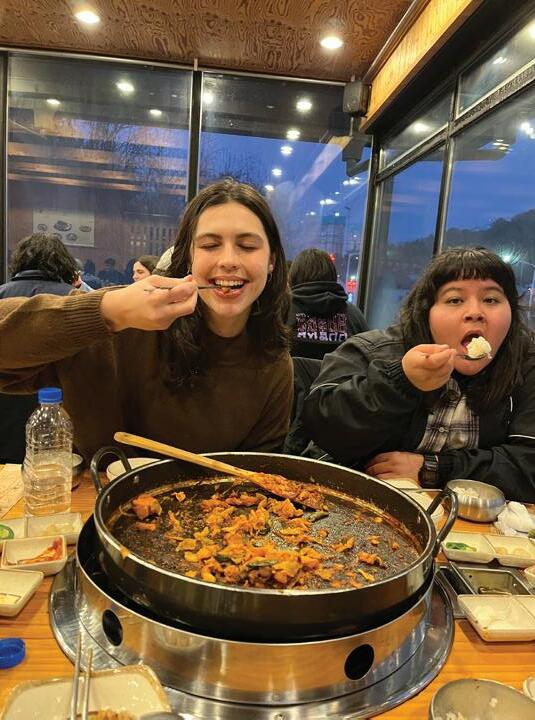
ON ONE LEVEL, MY STORY IS SIMPLE. I was awarded a Fulbright grant to teach English in South Korea. My application passed two intensive reviews, one by Fulbright’s National Screening Committee (NSC) and another by the Fulbright Commission of my target country. I’m currently spending my first semester in a country that has fascinated me for years.
It’s a simple story of success that every Fulbright recipient can tell. But its simplicity belies many of the experiences that come with applying: The intricate essays, revision after revision, securing recommendations, and putting your entire life on hold for the 7-month decision timeline. For me, it also doesn’t represent my previous “failures.”
After being selected as a finalist, I was surprised to discover that my feelings about receiving the award were complex. I was both excited for the adventure ahead and wary of being officially presented to the world as a Fulbright recipient. The people around me were interested in my experience, but I felt almost ashamed mentioning that it was my third time applying. I wasn’t the seemingly effortless recipient like those who had inspired me – how satisfying that would have felt!
Instead, I kept applying even after I graduated from USF and began working as the Experiential Learning Assistant at the Judy Genshaft Honors College (JGHC). In this role, I grew professionally and personally, which was reflected in my following applications. After two disappointing decision letters, I almost didn’t apply a third time. It was only thanks to Lauren Chambers, the Fulbright Program Advisor for USF’s Office of National Scholars, that I rallied myself to hit submit one last time.
While working on my final application, my previous rejections forced me to evaluate myself from an outside perspective and consider how I could better represent my experiences with Korea and professional interest in continuing that involvement through Fulbright. I also came to accept that some aspects would always be out of my control: The factors that go into selecting recipients vary not only by country but also by the
specific qualities the NSC and Fulbright Commissions prefer each year. Because of this ambiguity, after I didn’t receive the award the first time, it felt like Fulbright was unattainable for me. However, not being selected didn’t mean I wasn’t a good candidate or that I wouldn’t eventually succeed – it just wasn’t the story I had seen nor expected.
It’s odd to think that I almost didn’t throw my proverbial hat into the ring again, but I’m glad I did and that I had support from ONS and my recommenders. A seemingly simple story of success doesn’t represent the times I “failed,” but that’s OK. Time spent crafting each application made me better at articulating my skills and working at the JGHC gave me invaluable experiences that will continue to serve me moving forward. My winding path through those three applications was incredibly productive. “Failure” is a label I no longer attach to my Fulbright story.
16 UNIVERSITY of SOUTH FLORIDA
Putting the Pieces of Leadership into Place
BY DIVYA PATEL, PSYCHOLOGY & CRIMINOLOGY, CLASS OF ‘23

STARTING COLLEGE IS LIKE LOOKING AT A thousand-piece puzzle poured out on the table. It can be intimidating at first but with personal investment you will have something beautiful to look back on. As students, we are the individual pieces, each uniquely shaped by personal experiences and passions, seeking to find where we fit in. For me, taking on various student leadership positions within the Judy Genshaft Honors College helped me find my place within this niche community.
At first, it was daunting to think I could be a student leader. The concept of leadership carried a sense of responsibility that I wasn’t prepared for and I wasn’t sure how to get started. However, after witnessing firsthand the welcoming community of honors students and seeing how supportive everyone is of each other, I took on the trifecta: resident assistant for the Honors LLC, Peer Mentor for the Honors Foundations program, and co-chair for the JGHC Student Council Volunteering Committee. In each of these positions, I learned about myself, connected with various groups of people, and found a sense of belonging amidst the larger USF community.
Each of these leadership roles carried responsibilities for my own contributions and responsibilities to those counting on me for support. But rather than being weighed down by the title “leader,” I instead learned that leadership really boils down to forging connections with others. As an RA, I remember staying up late at night baking cheesecake and playing golden goose in the pod. I felt proud of creating these moments where people felt at home with each other.
While working with first-year Honors students in my Peer Mentor role, I collaborated with an amazing group of peers and faculty that have been supportive and encouraging of my own passions and ambitions. Likewise, I’ve gotten to do the same by being a support system for my group of first-year students as they navigated their first semester in college.

Finally, the JGHC Student Council introduced me to some of the most talented, funny, and compassionate people. I will cherish the memories we made playing virtual trivia with older adults at assisted living facilities because it was then that I realized the Honors community transcended the social barriers that Covid brought us. Our commonalities connected us with each other despite being online in different states and parts of the world.
College offers so many opportunities to learn about yourself, others, and the world around you. The sheer size can make it overwhelming to find your place and get started, but I have found that connecting my individual puzzle pieces with others that click helped me to forge meaningful relationships and create a beautiful image of my college experience. I encourage all new students to take a risk and do the same!
JUDY GENSHAFT HONORS COLLEGE 17 STUDENTS
Opposite Page: Pontious enjoys bulgogi with a new friend during her Fulbright orientation in South Korea.
Right: Patel, front, with students living in her pod in the Honors Living Learning Community.
Apply for National Scholarships –But Remember, The Joy is in the Process
BY SAM RECHEK, POLITICAL SCIENCE AND PHILOSOPHY, CLASS OF ‘23


IF YOU’RE CONSIDERING REACHING OUT to the Office of National Scholars (ONS) for help with an application, I would tell you to absolutely go for it. But my reasons might not be what you think.
It might be tempting to look at potential outcomes: attending graduate school on a scholarship, earning the distinction of being a “scholar” of this or that sort — these are enticing results. Yet, there are better reasons to apply for the prestigious fellowship programs sponsored by ONS, and they are entirely independent of outcomes.
Writing applications is an intrinsically rewarding process of self-reflection and growth.
Fellowship applications are not like college applications or job applications. They ask probing questions that applicants may never have encountered before. They require careful
reading, hours of study, and stylistic fine-tuning. They ask applicants to turn inward and share what it is that makes them “tick.” The amount of personal reflection and time it takes to learn how to think about your goals and talk about yourself can be like a part-time job.
Just like a job application, however, building a national scholarship application involves meeting the criteria in the “description.” Each scholarship is established with a mission, and it is the applicant’s job to show why their passions align with the criteria sought in a candidate.
It might seem like building an application to meet selection criteria involves creating an inauthentic persona, molding yourself into the “perfect” candidate. In reality, however, the trick is to pick out the features of your authentic character that already align with a scholarship’s mission. Doing so requires real self-awareness.
In my college career, I went through three scholarship application experiences. The first was an application for the Phi Beta Kappa Key into Public Service Scholarship (KIPS) in 2021. This program offers a scholarship and conference that provides training, mentoring, and reflection on pathways into local, state, and federal government careers. The second was an application for the Truman Scholarship, the premier graduate fellowship in the United States for those pursuing careers as public service leaders. The third was an application to the Marshall Scholarship, which provides funding for post-graduate study at any university in the UK. I was awarded the former, and I was a finalist for the latter two.
These applications forced me to grapple with deep questions about my interests, which lie at the intersection of philosophy, politics, and law. While putting together my application for KIPS, I was confronted with the dilemma: If I am attracted to both the career of a scholar and the career of a public servant, how can I do both? The answer, for me, lay in public law; judges, for example, are authors of legal scholarship even as they serve. While applying for the Truman Scholarship, I had to reexamine my reasons for aiming at law school, and I learned how to see myself as a changemaker rather than a leader. While applying for Marshall, I was challenged to view the issues that motivate me from the perspective of the US-UK relationship.
Each of these scholarship application processes deepened my understanding of myself. Each time, I entered into a process of critical self-reflection; each time, I was more in tune with myself than when I began — irrespective of the outcome. The questions asked of me not only reinforced my values and goals but applying those goals to the stated purpose for each award helped me to see new opportunities for my future and understand new layers of myself.
In short, writing applications can teach us things about ourselves. What will they teach you about you?
18 UNIVERSITY of SOUTH FLORIDA
Rechek at the First Amendment Monument in Philadelphia, PA.
100 Days of Discovery
BY SHALINI SUBRAMANIAN, BIOMEDICAL SCIENCES, CLASS OF ‘22
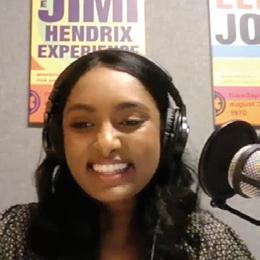
IN THEIR OWN WORDS STUDENTS
perform it for 100 days. The goal is to commit to consistently practicing something that nourishes the creative spirit within oneself. As Professor Arnone says, “Creativity is selfcare.”
My classmates have chosen various projects, including powerlifting, learning dental facts, botanical art, documenting everyday life, language acquisition, and embroidery. Each week in class, we learn about each other’s journeys and collaborate on connecting our projects to our local and global communities.
WHAT COMES TO MIND WHEN YOU HEAR the term “Honors class?” Perhaps you envision high academic expectations, competition amongst peers, and an intense workload. While Honors courses at USF expect a lot of student contribution and commitment, the main goal is to cultivate a space for critical thinking, personal growth, and friendship. The courses I’ve taken at the Judy Genshaft Honors College are unlike any I had imagined taking in my undergraduate career. They are curiosity-driven and embrace collaboration. For example, my current Honors course has redefined how I approach commitment and creativity in my everyday life.
100 Days of Discovery: Cultivating Your Curiosity and Finding Relevance

This course is led by Professor Arnone, a flute soloist and instructor passionate about connecting to communities through music and art. The 100 Days of Discovery class is inspired by the 100-Day Project, where individuals choose one action and
My 100-Day Project is to create a podcast called “HonoraBULL Insights,” where I converse with Honors faculty and staff about their journey to social awareness, research, humanities, and sustainability. There were many moments in my academic journey when I wanted to learn more about my instructors and seek mentorship. Through my podcast, I’ve connected with many individuals at the Honors College and challenged myself to step outside my comfort zone by pursuing a creative endeavor such as filming. Most importantly, I wanted to create something bigger than myself. In my podcast, I find relevance by dedicating a space to share perspectives on academia, society, and self-discovery. I hope glimpses of these conversations will motivate students to reach out to faculty, get involved, and invest in creative projects for themselves, regardless of their primary field of interest. College is not just the time to further your skills and prepare for your career; it’s also the perfect time to explore, play, and tap into that creativity.

JUDY GENSHAFT HONORS COLLEGE 19
the QR code to listen to the podcast episodes and hear my interviews!
Scan
Left: Subramanian interviews Dr. Lindy Davidson for her HonoraBULL Insights podcast.
Interdisciplinary Action: How Scientific Research and Environmental Humanities Merge
BY KOBE PHILLIPS, ENVIRONMENTAL BIOLOGY, CLASS OF ‘24

novel stressors like urban environments or new geographic regions. After graduation, I plan to pursue a Ph.D. in Ecology and Evolutionary Biology and conduct research that addresses community needs in order to benefit both the environment and all the organisms in our shared space, from honeybees to humans.

ONE OF THE BIGGEST QUESTIONS WE FACE as students is how to integrate our passions for multiple and sometimes wildly different academic disciplines into a single fulfilling career. At first, finding connections between different topics may seem nebulous - perhaps even scary- yet it is in this gray area that real opportunity exists!
One thing many people don’t realize is that finding your passion isn’t something that goes off like a lightbulb when you stumble upon an idea. Often, it is the passive voice in the back of your head that whispers, “This is intriguing.” It’s the first thought when you wake up that gets you excited for the day ahead. For me, those thoughts included my love for honey and beekeeping, an emerging interest in ecological systems, and an unexpected opportunity to teach others about sustainable urban gardening to combat food insecurity.
Cultivating these interests into passions and then into a career takes time, investment, and mentorship. Through conversations with mentors in the Office of National Scholars I discovered that a career in ecology was not isolated from my interests in humanities. My interests might initially seem disjointed: bees, honey, evolutionary biology, food security, and human rights. But the truth is they are connected: by me.
To me, honeybees provide an ideal model of community that humans can use to identify and implement sustainable changes to our own ecosystems. I envision a world in which humans have a sustainable, symbiotic relationship with the Earth and its organisms, in pursuit of a neo-biosphere in which all members can thrive. This big idea was fostered by my fascination with viewing human-honeybee relationships as a merging of cultural relationships with the environment that is both beautiful and awe-inspiring.
But how do we create spaces that unify the needs of both humans and other organisms, and why are some organisms better at adapting to the Anthropocene than others? These are the questions I intend to answer throughout my career. As a student at USF, I work in the Martin Lab on epigenetic variation and phenotypic plasticity, which allows me to explore how the environment impacts organisms’ ability to adapt to
It is important to remember the power that you have as an individual to connect the dots of your interests by utilizing your resources available in college. The Judy Genshaft Honors College provides students opportunities to explore outside of our given majors, teaches us how to identify the value of sometimes conflicting perspectives, and offers excellent mentorship through faculty and advisors. The college also offers structured opportunities to find funding to pursue our passions through the Office of National Scholars. As a result, I approach graduation feeling empowered to take action on major issues in the world by pairing my passions with a clear pathway to a career.
20 UNIVERSITY
of SOUTH FLORIDA
Phillips working with bees at USF’s Botanical Gardens.
Support and Success from ONS
BY KEERTHANA KALLARACKAL, POLITICAL SCIENCE AND PHILOSOPHY, CLASS OF ‘22
IN THEIR OWN WORDS STUDENTS
and Dr. Basu, the ONS Director. She also connected me with the 2021-2022 Fellow from USF, who provided vital advice and experience that only a Fellow could convey. During the mock interviews, Ms. Chambers and Dr. Basu asked challenging questions that forced me to understand myself and my policy position. I sincerely appreciate their insight and experience because the skills they nurtured set me up for success. Finally, at the end of March, I learned that I was selected to be a Florida Gubernatorial Fellow Class XVIII!
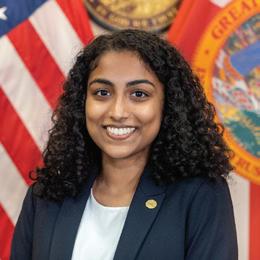
WHEN LAUREN CHAMBERS, Associate Director of the Office of National Scholars (ONS) first reached out to me about the Florida Gubernatorial Fellows Program, I had just finished up the fall semester of my third and final year at USF. I was researching post-grad opportunities in law and politics, and Ms. Chambers serendipitously reached out to me about the Fellows Program.
The Florida Gubernatorial Fellows Program is a non-partisan program where Fellows receive advanced on-the-job training as well as an invaluable front-line view of the inner workings of government during a nine-month internship in Tallahassee, FL. In addition to placement in a government department, Fellows meet with top state leaders for weekly lectures and even travel to Space Florida, Camp Blanding, and Washington D.C., for policy development workshops.

I am currently placed in the Florida Department of Law Enforcement (FDLE), as the agency’s first Florida Gubernatorial Fellow, within the Office of the Chief of Staff, which includes Communications, Legislative Affairs, and Policy and Planning. I work on projects from strategic planning to media communication to budgeting and legislation. I am also tasked with establishing a member wellness program dedicated to retaining law enforcement officers in the state of Florida. The hard work of refining my positions and learning to articulate my ideas for the interviews have had a direct impact on my daily work in this role.
The Office of National Scholars helps students envision their future goals, engage in the sometimes tough work of personal reflection, and sets us up for success. Their mentorship and support have been key to my own growth and have inspired me to continue looking for ways to serve more people through my interests in law and politics!
The fellowship matched my interests, so I applied in January 2022. I worked with Ms. Chambers to ensure my application was organized and reflected my passions and interests. Despite the very short timeframe for application, Ms. Chambers stayed in constant communication and made me feel calm through the process, giving me hope that the goal was achievable.
In February, I received emails from the director of the program that I was selected for the regional interview. Then, in March, I was invited to the final interview in Tallahassee - my first time being interviewed by a large panel! As soon as I shared the news with Ms. Chambers, she set up mock interviews with her
JUDY GENSHAFT HONORS COLLEGE 21
“
The Office of National Scholars helps students envision their future goals, engage in the sometimes tough work of personal reflections, and sets us up for success.”
– Keerthana Kallarackal
Kallarackal joins the Florida Gubernatorial Fellow class at the Florida State Capitol.
Growing into a Goldwater Scholar
BY CAITLYN COLEMAN, MICROBIOLOGY, CLASS OF ‘23
THREE YEARS AGO, I had no idea what a Goldwater award was. I was a bright-eyed 18-year-old student with big dreams of starting her own biotechnology company. I had everything planned out - the company had a name and I knew who I wanted to partner with. That’s the goal I shared with Dr. Basu, Director of the Office of National Scholars, in our initial meeting.

But by the end of my first year at USF, my career path had completely changed. I was selected to participate in a coursebased undergraduate research program called the Science Education Alliance-Phage Hunters Advancing Genomics and Evolutionary Science (SEA-PHAGES) program, led by Dr. Pollenz. Jumping into research was challenging, but I found it was my favorite part of the day, which led me to apply to be a teaching assistant the following year. I loved teaching and sought out additional opportunities including working as a Peer Mentor for the Judy Genshaft Honors College, where I helped new Honors students acclimate to college. The following year I advanced to being a Peer Mentor Lead, collaborating with the rest of the PML team to develop the Canvas course for Honors Foundations. These activities were gratifying, but I initially saw them as separate from my passion for biotechnology.
Through my conversations with Dr. Basu, I learned to take a step back and reevaluate my goals and consider the impact I could have as a scientist. The joy I gained from mentorship and teaching combined with my love of research align with the work of college professors. In addition to providing mentorship about career paths, the Office of National Scholars supports students through the intricacies of applying for opportunities that support those career goals. For me, that meant Research Experiences for Undergraduates (REUs), which are specific research programs hosted by universities across the nation. These programs offer paid, intensive summer research experiences on topics not
offered at USF, along with networking and mentorship from faculty who are the top in their field. Dr. Basu served as my mentor, guiding me through the application process, which involved writing a personal statement, submitting letters of recommendation, and other program-specific elements.
I conducted research both at USF and through REUs at Cornell University and the University of Georgia. At USF I was a part of SEA-PHAGES, SEA-GENES (Gene-function Exploration by a Network of Emerging Scientists), and worked on the USF Venice Project with anthropology faculty Dr. Vianello. I am currently completing my Honors thesis in the Zalamea lab, which investigates the impact of microbes in the soil on forest ecosystems. Dr. Basu believed my research journey made me a strong candidate for the Barry Goldwater Award, which recognizes excellence in STEM with tuition assistance for STEM degrees. Learning how to communicate my research interests and experiences for REU applications prepared me to complete the Goldwater application and I was honored to be named as a 2022 Goldwater Scholar.
My sincerest gratitude to my mentors at USF, Cornell University, and the University of Georgia. I aspire to provide my future students with the same support and encouragement I had during my undergraduate studies and continue to create opportunities for future student scientists.

22 UNIVERSITY of SOUTH FLORIDA
Finding Community and Tradition at USF
BY CARLA IRIZARRYDELGADO, BIOMEDICAL SCIENCES, CLASS OF ‘25
FOR THE ENTIRETY OF MY FIRST YEAR AT USF, I was essentially silent. I had maybe four non-academic conversations with people on campus in the span of two semesters – other than that, I was detached from the rest of the university. It’s easy to get lost here, but I am taking this opportunity to invite you to go against the current.
I was born and raised in Puerto Rico, where I was comfortably immersed in our vibrant culture. When my family moved to South Florida right before my tenth birthday, I was quickly thrown into a melting pot of cultures, people, and traditions.
I loved it (and still do!), but at the same time, I had to realize that my personal culture is only one of thousands. Not everyone speaks my language, eats my food, or celebrates my holidays. There is power in this, but at the same time there is a degree of isolation. On top of that, I have dealt with varying health challenges throughout my life – they have made me feel different in ways I do not always appreciate but am ultimately grateful for because of the strength they give me.
When I came to USF, I felt isolated all over again. USF is wonderfully diverse and unique, but sometimes differences can be alienating. On a campus full of varying cultures, some typical college traditions can be lost in translation, such as American university staples like football and Greek life. In order to get the satisfaction of experiencing meaningful traditions, I had to look inward and analyze why I was here in the first place.
I chose USF for its outstanding health programs and Preeminent Research University status, not to mention the Judy Genshaft Honors College’s unmatched benefits. USF was promising and it has absolutely delivered on that front – this university has given me all I wanted academically. Yet, I realized what I was missing was not something USF could offer me; it was something I had to contribute myself. I realized I was passively receiving USF’s opportunities but was not actively doing anything to actively engage with campus. As I looked around, I saw many chances to give back, and just needed to find the courage to say yes.
It was then that I decided to join the Marketing and Public Relations committee of the Judy Genshaft Honors College

Student Council (JGHCSC) during my second semester at USF. The weekly virtual meetings gave me a voice within the JGHC. The other members made me feel valued and included. This positive experience led me to apply for an Executive Board position for the next Fall semester, and I now happily lead committee meetings and social media for the JGHCSC.
I also got involved in the JGHC as an Honors Foundations Peer Mentor, so I could create a safe space for first year students to ask questions and learn from my experiences. My Geographical Perspectives Honors class opened a door for me to become part of the College of Public Health’s Maternal and Child Health Scholars for Social Justice program, which has fueled my passion for public health.
All these experiences help me know what’s going on around campus, which gives me a sense of belonging. Now I recognize people around campus and meet others in situations like my own. This may not seem very important to some, but for a person who lives off campus and has struggled to make friends in the past, it means everything.
Being involved in the JGHC and the USF community also gives me a reason– beyond my academic responsibilities– to get up in the morning despite the battles with my health. I find myself constantly exceeding my own expectations of what I can do. I can feel myself turning into the leader I had always wanted to be but never believed I could. I finally have the sense of belonging and traditions I had been looking for.
I believe that more students in situations like mine should take advantage of everything the JGHC and USF have to offer. I don’t exaggerate when I say I haven’t met a person at the JGHC that hasn’t been wholeheartedly rooting for my success. And I am rooting for your success too. Take my words as an invitation to connect with others and form memories and traditions that will not only impact your college experience, but your entire life.
JUDY GENSHAFT HONORS COLLEGE 23 IN THEIR OWN WORDS STUDENTS
“
I find myself constantly exceeding my own expectations of what I can do. I can feel myself turning into the leader I had always wanted to be but never believed I could.”
– Carla Irizarry-Delgado
Digging into the Archives: Looking Back on 40 years of Honors at USF
 BY DR. CAYLA LANIER, ASSISTANT DEAN, SARASOTA-MANATEE CAMPUS, CLASS OF ‘03
BY DR. CAYLA LANIER, ASSISTANT DEAN, SARASOTA-MANATEE CAMPUS, CLASS OF ‘03
THE 2022-2023 ACADEMIC YEAR reflects two special anniversaries: 40 years since the inception of the University Honors Program in 1983, and 20 years since the transition to an Honors College in 2003. To celebrate these milestones, Honors alumna and Assistant Dean Cayla Lanier dug into the archives, and her memories, to reflect on how the program has evolved over the years.
IFIRST STEPPED FOOT on USF’s Tampa campus in March 1999. I had already put down a housing deposit at that university a little further north up I-75, but an invitation to USF’s Honors Program had me second-guessing my choice. So, my mom and I visited USF and I quickly fell in love with the bright pink bougainvillea, tropical climate, and palpable energy and excitement on campus.
I came back a few months later for Orientation, and got lost navigating my way from the old Marshall Student Center to Cooper Hall for the required Honors Program meeting. Upon entering the classroom, I was offered two triangles of a Publix ringleader sandwich, a spot on the floor, and a warm welcome from a quirky fellow in black jeans and a golf shirt, who was in dire need of a haircut. When he introduced himself as the dean, my eyebrows shot up and I sneaked a few looks around the room to see if any-
one else was as surprised as I was. First impressions aside, Dr. Silverman quickly ingratiated himself to me and others with his advice. “When it gets hard, and it inevitably will, come find me. We’ll work it out and you will be just fine here.” Since that day, I have called on his advice more times than I can count and he has never failed me.
After graduating with a B.S. in Marketing and Honors College distinction (one of the first to graduate under that new
24 UNIVERSITY of SOUTH FLORIDA
“When it gets hard, and it inevitably will, come find me. We’ll work it out and you will be just fine here.”
2012
– Honors Dean Emeritus Stuart Silverman
Honors Dean Emeritus Stuart Silverman
name in 2003), I pursued a Master’s degree, got married, and eventually found my way back to Tampa to start my career. When I saw an opening for an Honors Academic Advising job, I applied immediately. My interview committee was made up of Dean Silverman, all of my old advisors, and a few new faces. I was thrilled to get a call just a few hours later from Dr. Silverman welcoming me to the team.


I began my professional career with the Honors College in October 2008, joining a team of just eleven people: Dean Silverman and Dr. Kleine, the Associate Dean, a development officer, five advisors, two admin support staff, and of course, Mr. Friday, longtime college receptionist at the front desk. We had 275 freshmen in our 2008 class, and the entire college totaled around 1,200 students. Today, fourteen years later, we inhabit our fourth location on campus
while our fifth and final location is nearing completion. Our second dean, Dr. Charles Adams, leads a staff of over 30 professionals, including a cohort of full-time Honors faculty, and we serve over 2,500 students on three different campuses. Despite this growth, the fabric of the college has not changed. When I first walked into Dr. Silverman’s office, I noticed a sign that proclaimed, “It’s the students, stupid!” The sign is now in Dean Adams’s office, along with the sentiment; the Judy Genshaft Honors College remains committed to serving students, mentoring their academic and personal growth, and sharing in their successes.
HONORS
When Dr. Silverman planned his retirement in 2014, it felt like the end of an era. He had spent nearly 40 years at USF, most of them directing the Honors Program. Sharon Geiger, 2002


JUDY GENSHAFT HONORS COLLEGE 25 THE COLLEGE HISTORY
1998
1987 2003 YEARS OF
the program’s second employee and Dr. Silverman’s right-hand woman, planned to retire at the same time, meaning the bulk of the institutional memory was leaving. I recruited five students to undertake a joint senior thesis to capture oral histories and document as much of the history of the college as they could. Many of the pictures in this article were preserved thanks to their work.
As I listened to the interview recordings in preparation for this article, my heart warmed at hearing familiar voices. During an interview with Ms. Geiger, I could hear Dr. Silverman walking down the hall greeting every individual with a hearty, “Good morning!” He treated
Cayla Clark Lanier proudly wore her Honors College medallion to the 2003 USF Commencement, cheered on by her grandparents and family.

each person as a member of the family, establishing a college culture of acknowledging and caring for each member that persists to this day. The results are tangible. The Honors College continues to be a home for students on campus, a place where students know they will be listened to, cared for, and supported. This caring community empowers them to go out and push themselves to achieve their goals.
Some traditions have held up over the years, such as grilling burgers at the annual Fall Honors Picnic at Riverfront Park and awarding Honors medallions at the Honors Graduation Ceremony. In the early years, there were so few graduates


that Dr. Silverman and Ms. Geiger would take students to Outback Steakhouse for dinner after the university commencement. In time, we expanded to University Lecture Hall, and eventually to Traditions Hall at the Sam and Martha Gibbons Alumni Center. The medallions changed too, as we transitioned from an Honors Program to the Honors College, and now to the Judy Genshaft Honors College.
As I reflect on my own history with the Honors College, I am struck by two things. The first is a deep sense of gratitude to be part of this amazing organization. I have quite literally grown up with the Honors College, as a young woman starting college, and as a young professional learning leadership, problem solving, and program management. Who I am as a person, a mother, a friend, and a leader is due in large part to the people I met through the Honors College – my deans, my professors, my first college roommate in the honors dorm, my co-workers, and all of the students I’ve been blessed to know over the years.
The second is pride in how much this organization has grown, and how much
Opposite Page: Genshaft and Greenbaum make history by naming the Judy Genshaft Honors College and create a vision for the future home of the college on the Tampa campus.
26 UNIVERSITY of SOUTH FLORIDA
2013
Left: Dean Silverman grills burgers at the annual Honors Picnic at Riverfront Park.
Above: Silverman poses with Student Council leaders, Kunal Mishra and Haley Frauen.
2003
we have accomplished over the last 20 years. Back in 2014 our Honors History research team asked everyone they interviewed about their hopes and dreams for the future of the Honors College. All of them have been realized.

• Sharon Geiger: “I hope they find a new dean that will continue our work. We’re just getting started with scholarships and study abroad. Those programs are critical and I hope they continue.”
• Mark Friday: “I hope we continue to serve students, giving them opportunities that are enriching and make a difference in their lives.”
• Arnie Mejias: “I hope our student-centered ethos does not change; it distinguishes the Honors College at USF from other honors colleges in the state and around the country, and parents tell me so. Going forward, I hope we are granted a new, more comfortable building, and it would be nice to have the College named, as are many other honors colleges. Finally, I hope we increase the travel courses and maybe a campus abroad.”
In many ways, it still feels like we are just getting started. Our newly named college continues to expand in geography and physical space. We are now on three campuses across the Tampa Bay area. A five-story, 85,000 square foot dedicated Judy Genshaft Honors College building will open its doors on the Tampa campus in May 2023, increasing our capacity to offer exciting courses and establishing a physical home that can accommodate all of our students at once. Students on our branch campuses are actively contributing to honors communities that reflect their distinct campus cultures. International partnerships continue to offer one-of-a-kind learning opportunities that prepare our students for their future careers. It’s an exciting time to be part of the USF Hon ors College … just as it has been for the last 40 years.
YEARS OF HONORS
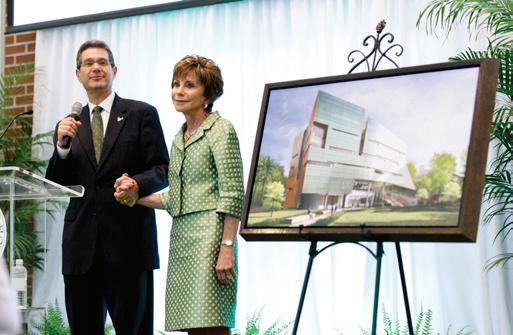
JUDY GENSHAFT HONORS COLLEGE 27 THE COLLEGE HISTORY
2019
40th art from cover
Q & A
BY DR. CAYLA LANIER, ASSISTANT DEAN, SARASOTA-MANATEE CAMPUS, CLASS OF ‘03
After Dr. Silverman’s retirement, Dr. Charles Adams joined USF as the Judy Genshaft Honors College’s second dean. In recognition of the 40th Anniversary college milestone and the excitement about the opening of the new Judy Genshaft Honors College building scheduled for May 2023, I asked Dr. Adams to sit down and reflect on his experiences as Dean of one of the most exciting colleges at USF.
August 2022 marked your eighth year as Dean of the Judy Genshaft Honors College. How has your impression of the college evolved from your first day on the job to today?
From the very start, I believed that we have the potential to be named among the very finest honors colleges in the country because of our outstanding students, talented and dedicated advisors, and innovative curricula and programming. I inherited a culture of excellence built on these three pillars, and from the start my job has been to realize the full potential of our strong foundation. I’ve focused on putting in place the people, funding, and facilities necessary to do the job, first in Tampa and now on all three campuses. We are now recognized among the very best in the nation, though the delightful irony is
Reflecting Forward: An Interview with Dean Adams
that with every successful step forward, new possibilities become clear, so that the goal of “full potential” may never be realized!
You have accomplished a lot in your short tenure as Dean: establishing a fulltime faculty, securing a groundbreaking gift to name the college and construct a dedicated honors building on campus, and much more. What are you most proud of?
I am most proud that through all the changes of the past eight years we have maintained a vibrant college culture focused on individual student success, both personally and professionally. The changes have been many: a successful expansion to three campuses, the establishment of a new application-based admissions policy to enhance our intellectual and social diversity, the creation of a dynamic full-time honors faculty, the expansion of a results-driven Office of National Scholars, a dramatic increase in the rate at which students complete the honors curriculum, expanded international programming, and of course the new building in Tampa and the nation’s only endowed honors deanship, thanks to the generosity of Judy Genshaft and Steven Greenbaum. But through these and other changes, the “feel” of the college has persisted – we care about excellence, and we care about our students as individuals and as future leaders in their chosen fields.
How do you see the new honors building shaping the future of the Judy Genshaft Honors College?
I have asked myself this question many times, and while I can point to specific enhancements to our curricula and programming that the building will
“
bring – the Food and Culture Studio, the Music Studio, the Digital Media Studio, the spaces for large events and performances, and so much more – I am most excited by the prospect of discovering the building’s potential for shaping our future as we grow into it. Whatever that looks like, I know that the building will be a beehive of intellectual activity and creativity for our students and for the entire university for decades to come!
What is the best part of your job as Dean of the college?
The students, first and last. As a group, our honors students are the most impressive and inspiring academic community that I have worked with in my career. They’re full of energy and ideas, serious about their education, curious to learn, and eager to make the world a better place. They are the reason that I and my colleagues in the college work hard on their behalf every day, and their successes make it all worthwhile.
28 UNIVERSITY of SOUTH FLORIDA
I am most proud that through all the changes of the past eight years we have maintained a vibrant college culture focused on individual student success, both persnally and professionally.”
– Dean Charles Adams
What are you most excited to pursue in your next eight years?
There is much to look forward to! For one thing, I am excited to nurture the development of our college on the St. Petersburg and Sarasota-Manatee campuses. There is tremendous potential for growth in both places, both in terms of numbers of students and range of curricula and programming. In Tampa, our focus for the next couple of years will be to maximize the potential of the new building through creative programming. The future of higher education, I believe, will depend on our ability to create
cross-disciplinary synergies to address the increasingly complex challenges of the twenty-first century. The JGHC is uniquely equipped to do just that, and our new building will provide the space for us to bring people and ideas together in dynamic and innovative ways.
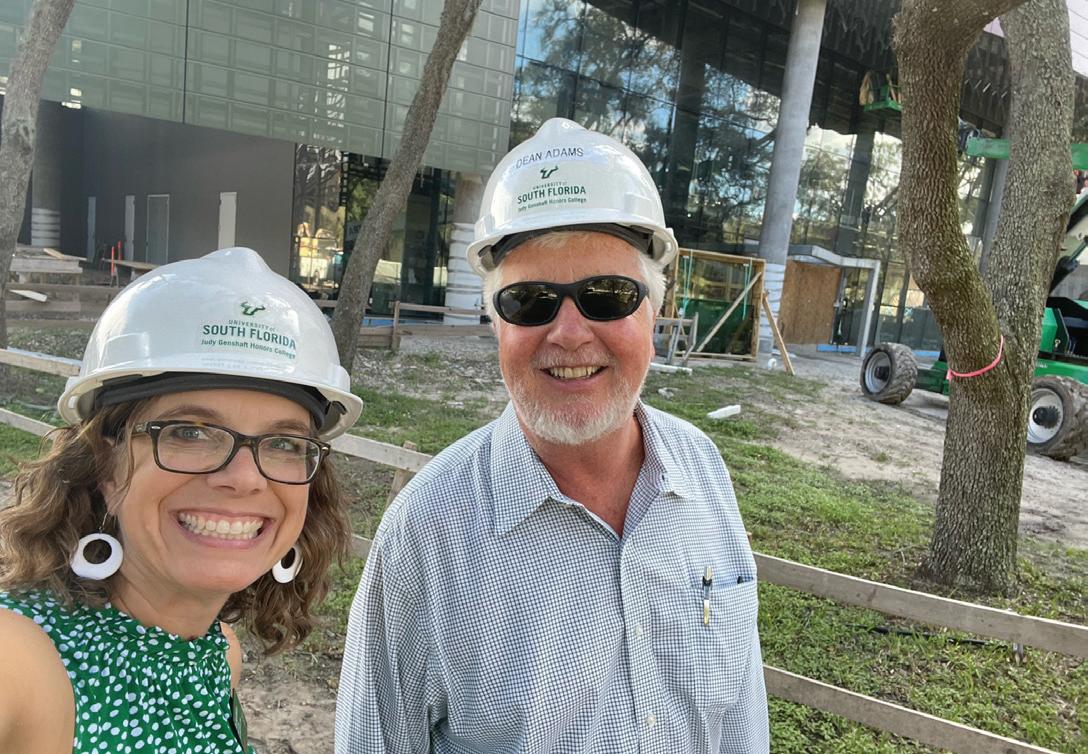
What are your hopes for the future of the JGHC and its students? What legacy do you hope to leave?
I am proud that – through the support of our donors, university leadership on all campuses, and the state legislature – the
college is on a much firmer financial footing than was the case in 2014. New endowments, world-class facilities, and funding more nearly commensurate with the achievements and potential of our students and staff have built a foundation for an ongoing pursuit of excellence. That pursuit will take different and varying shapes as the years roll on, but the work will remain the same: to create a nourishing educational environment in which the thought leaders of the future can become their best selves.
JUDY GENSHAFT HONORS COLLEGE 29
THE COLLEGE LOOKING FORWARD
Associate Dean Lindy Davidson joins Dean Charles Adams on a hard-hat tour of the Judy Genshaft Honors College building construction site. The building is scheduled to open May 2023.
To learn more about how you can support the building, contact Judy Kane at kane@usf.edu.
Building a Future: Documenting the History of our Future Home
BY SOFIA GLUSKIN, BIOLOGY, CLASS OF ‘23 AND KYLE BALLADO, MECHANICAL ENGINEERING, CLASS OF ‘23
AFTER YEARS OF PLANNING AND CONSTRUCTION, the new home of the Judy Genshaft Honors College is set to open in the spring of 2023! The Honors College building will host a variety of students across the Tampa campus, offering connected spaces for classrooms, study areas, faculty offices, event spaces, creative studios, and numerous areas for collaboration.
In the semesters leading up to the grand opening of this home on campus, Professor Atsuko Sakai has offered an Honors Capstone course called Exploring Behind the Veil: The New Honors Building. Each semester, her students toured and documented the construction process during various stages while studying topics such as structural foundations, the architectural design process, Leadership in Energy and Environmental Design (LEED) and sustainability, collaborative spaces, neuroscience in architecture, and much more. Some of the students wanted to remain involved even after the course ended and formed a student workgroup to continuously support building tours and educational activities for non-Capstone students.
In addition to readings and class discussions, the course also included guest lectures from professionals involved in the design and construction of the Honors College building, including
a collaboration with the USF Facilities Management Architecture Engineering Construction Experience organized by Steve Lafferty, director of design and construction for USF Facilities Management. Students also took two site visits per semester to tour the construction site hosted by the Beck Group.

FROM THE GROUND UP
First offered in Fall 2021, the primary curricular focus of the Capstone course was structural design. Students witnessed the bare bones of construction firsthand, learning about building foundations, concrete testing, and geotechnical engineering. The very first Honors Capstone course site visit was full of concrete, dust, and scaffolding – very different from what we see today!
Kyle Ballado and Sofia Gluskin took Professor Sakai’s capstone course in Fall 2021. In their final group project, “The New Honors College: A Holistic Experience, Not Just a Building,” they and their fellow group members created a narrated presentation that could be used as a foundation for future educational materials about the new Honors College building. “There are so many facets to the building that make it not only unique to USF but to the state as a whole,” remarked Ballado. “So much love has been poured into the project, and you can see that in the work that everyone does.”
Reflecting on her experience in the course, Gluskin says, “I really loved how interdisciplinary this capstone was. People of all different majors were able to learn something new each day. I gained an understanding and appreciation for what goes into the architectural process, from beginning to end.” In her letter to future Honors students, part of the final portfolio that each student produced at the end of the capstone, Gluskin wrote, “I hope you enjoy every new feature, from the learning lofts to the art and food studios to the café. Know that every detail was meticulously planned and fabricated, from the concrete and metal foundations which extend over 100 feet into the ground to the very finishes of the chairs that you will sit in.”
Sophie Roth-Knigin and Samantha Zappala also took the capstone course in Fall 2021. “The process to create the new building started before I was even in high school and is the result of hundreds of perspectives and workers, so there will always be more to uncover about the building,” says Roth-Knigin.
In her letter to future students, Zappala commented on her site visit experiences, “Stepping foot inside of the building during construction was such a unique opportunity. At each site visit, there were various professionals who gave us the tour and informed us about the current construction phase and milestones. Being able to ask questions of these experts was a rare opportunity, and it is something you should certainly take advantage of.”
30 UNIVERSITY of SOUTH FLORIDA
FUTURE FOCUSED
Jasmine Robins, an Honors Peer Mentor Leader (PML), and Karlyn Reinhardt, an Honors Peer Mentor (PM), were also students in the Fall 2021 Capstone course. They have incorporated their knowledge from the Capstone and interactive educational materials from their final group projects into teaching Honors Foundations, a discussion-based course for new USF Honors students in their first semester.

In Spring 2022, the Capstone course focused on LEED and sustainability. Students were engaged in LEED sustainability efforts that were used throughout the building. Matthew Stoner took the Capstone in its second semester. He says that “one of the important parts of being LEED-certified is finding ways to engage future residents and visitors of the building in learning about the different sustainability efforts that went into the design and construction of the building.” His group’s final project is an interactive tour/scavenger hunt to be used in the new building which incorporates various LEED-related content.
As a PML, Robins was able to create a curriculum for incoming Honors students. She says, “I used this position to incorporate something that I thought was so incredibly important! I completed my Capstone a year ago and thought that spreading the information I learned to freshmen through Honors Foundations would make them more excited about being in the Honors College.” She used her final group project as a template for the new Honors Foundations materials. Reinhardt adds, “As a PM, I was able to have first-hand experience sharing the module
THE COLLEGE
Follow the QR Code below to read more of the oral histories gathered by Sakai’s Fall 2022 class and see behind-the-scenes perspectives of our future home.

and my knowledge with my class. I think that my students not only enjoyed getting an inside glimpse of what the building will be like but also developed an interest and enthusiasm for all the possibilities that are to come to the Honors College.”
MARKING THE OCCASION
“This building is so complex that it takes more than a semester to understand it in depth. To fully appreciate our new learning environment, we should document this unique moment of our Honors College and utilize the whole building as an interdisciplinary textbook,” says Professor Sakai, who is an associate member of American Institute of Architects, and holds a LEED AP BD+C, along with 25 years of experience in Architectural Design Education. Sakai adds, “In the fall of 2022, my students collected oral histories from the professionals who were part of the design/construction process, and this spring, we are getting ready for the opening by designing a variety of guided tours for different groups of visitors!”
The Judy Genshaft Honors College building is already educating students, even as it continues through the final stages of construction. Under Professor Sakai’s leadership, students have documented the design process and captured decisions as they are being made for historical context. Sakai’s courses are emblematic of the powerful impact of experiential and community-based learning, in which our students are able to learn in real-world settings.
JUDY GENSHAFT HONORS COLLEGE 31
Community Connections
The Judy Genshaft Honors College curriculum emphasizes experiential learning opportunities; from volunteering on their own in local communities to participating in activities embedded into the classroom, students learn to make connections between the textbook and real life.

A: JGHC Community Garden Project
JGHC ‘Rooted in Place’ Community Garden students recycled reclaimed materials and built a trellis to support vegetable growth. Students in this course learn about the vegetable planting and harvest cycles, sustainable gardening practices, and engage in consistent volunteerism to keep the garden growing all year long.
B: Hands-On History
In Spring 2022, JGHC students at USF St. Pete enrolled in a service-learning course called Hands-On History at Heritage Village. Sponsored by a grant from Florida Humanities, JGHC students created an interactive, multimedia installation at Heritage Village with support from museum experts from the Smithsonian Institution. Madeira Beach: On the Waves of Change, explored the intersection of human and environmen-
tal history in a small beach town, tackling issues like urban development, climate change, and sea-level rise. Students practiced professional skills from science communication to graphic design while giving back to their community.
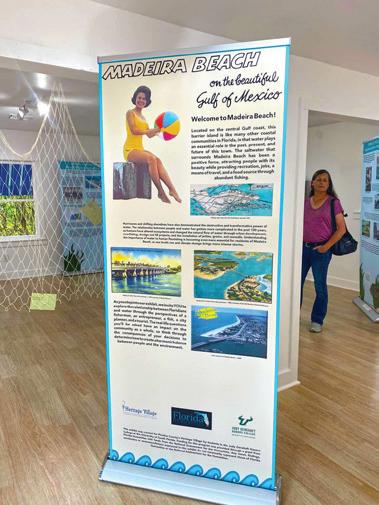
C: Helping the Homeless in Sarasota
USF Sarasota-Manatee students partnered with the Office of Multicultural Affairs for an MLK Day of Service to create personal hygiene kits with items donated by faculty, staff, students, and the greater community. Over 100 hygiene kits were then donated to several homeless shelters throughout Manatee County.
D: Community-engaged and Art-based Learning with AMRoC
Students in Professor Carolina Miles’ summer Community Mural Creation course worked together to paint a large canvas mural in the AMRoC Fab Lab located at University Mall, near USF’s Tampa campus. The Advanced Manufacturing & Robotics Center (AMRoC) is a program of the nonprofit Foundation for Community Driven Innovation, dedicated to building capacity in the University Area and Tampa Bay community. AMRoC aims to inspire personal empowerment through creative self-expression and to bridge the manufacturing and
A32 UNIVERSITY of
SOUTH FLORIDA
COMMUNITY D
Cindustry talent gap through robust project-based engineering education and training. The students in this community-engaged course learned about important concerns and points of pride from community stakeholders and then worked together to design and complete a colorful mural that now hangs in AMRoC.

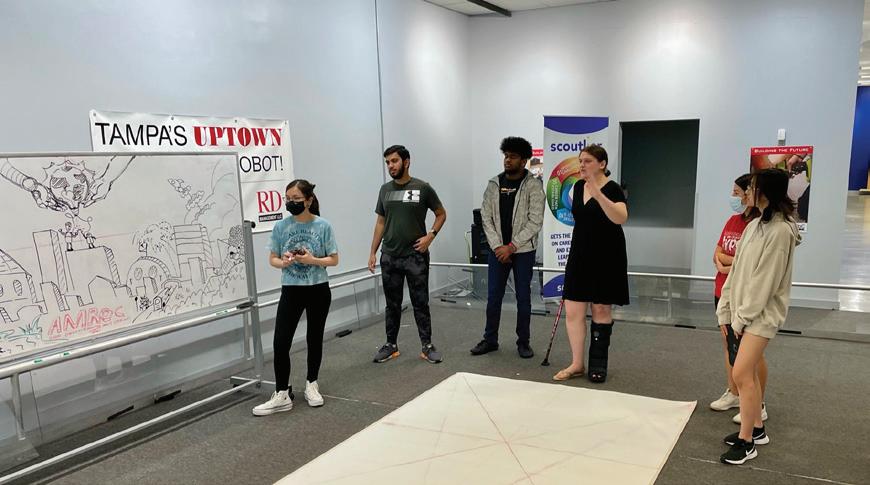
E: Trunk or Treat in the ‘Pete
USF St. Pete’s JGHC Student Council, under the mentorship of advisor Dani Soluna, pictured, in costume as Ms. Frizzle, hosted more than 300 USF and City of St. Pete employees and their children for our first annual Trunk or Treat. Chancellor Hardigree sponsored decorations for about a dozen trunks, which were filled with candy and toys for community children. Honors students gained valuable leadership and event planning skills, while kids in attendance had a great time participating in activities like face painting, mummy rolling, pumpkin painting, a costume contest, and more.


EJUDY GENSHAFT HONORS COLLEGE 33
FF: Garden to Table Cooking

Student instructor Kobe Phillips inspired students in the Sustainable Foods Cooking Challenge as part of the curriculum for the ‘Rooted in Place’ JGHC Community Garden course. The JGHC Community Garden is managed by student leaders and volunteers in partnership with the USF Botanical Gardens. Food is harvested and donated to the Feed-A-Bull campus food pantry.
G: Dive into Reading
Each year, the Anna Maria Oyster Bar hosts students from Title I schools across Manatee County for a summer reading program called Dive into Reading. Dr. Cayla Lanier, Assistant Dean of the Judy Genshaft Honors College at USF Sarasota-Manatee, has volunteered as a reading mentor for the last two years, spending an hour once a week with elementary school children reading aloud, practicing sight words, and learning table manners over the course of four weeks. Participating children select a new book each week, which they take with them to build an at-home library, along with a backpack stocked with school supplies once they finish the program. Dr. Lanier hopes to include more honors students in the 2023 program to expand the impact of the program.

H: Sharing USF Pride
Honors Advisor Dani Soluna and Dr. Cayla Lanier, Assistant Dean, marched alongside several USF Honors students and USF alumi in the St. Pete Pride Parade. They handed out special USF Pride beads and got many Horns Up hand signs from parade goers as they walked the route. Go Bulls!
I: Touring the Sarasota Opera House
Sarasota is often called the “City of the Arts.” USFSM
Acquisition of Knowledge students took full advantage of our backyard and explored the beautiful Sarasota Opera House through a behind the scenes tour hosted by Director of Development, Scott Guinn. The tour reinforced classroom discussions about performance and the roles we play in our everyday lives, adding a tangible experience to the theoretical discussion held in class.
34 UNIVERSITY of SOUTH FLORIDA
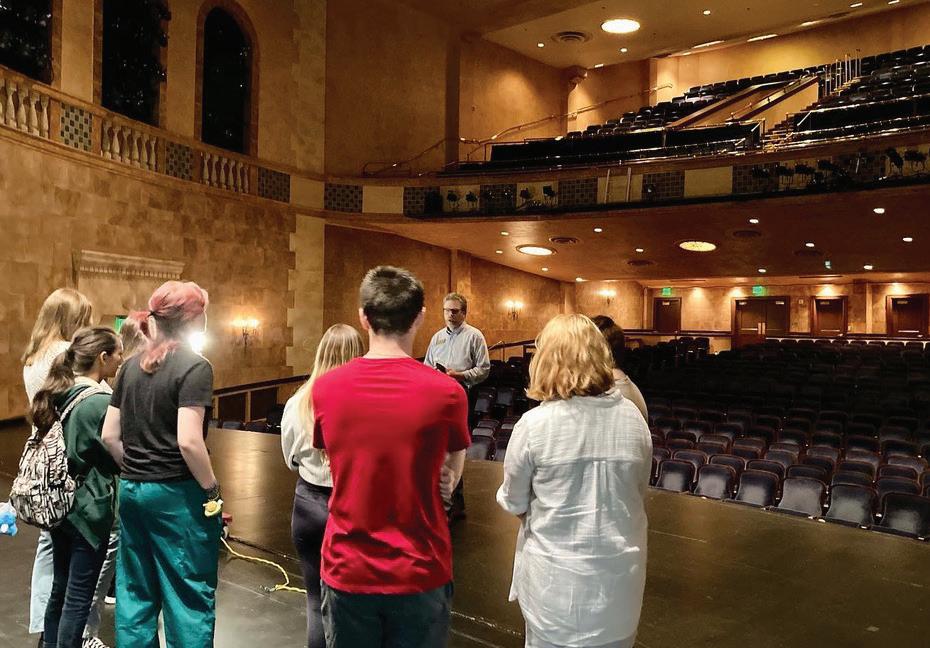

IHJUDY GENSHAFT HONORS COLLEGE 35 COMMUNITY
Passions, Purpose, and Pedagogy: Meet our Newest Faculty
BY DR. CAYLA LANIER, ASSISTANT DEAN, SARASOTA-MANATEE CAMPUS

In 2022, we added two full-time faculty in the Judy Genshaft Honors College, Dr. Andrew Hargrove and Professor Tina Piracci. Learn how they bring their passions and purpose into the classroom.
help students understand and accept different perspectives as valid. These skills are more than educational buzzwords for Hargrove, but a matter of existence. Through their global experience, Hargrove saw both the beauty of our natural environment and the alarming rate of climate change and environmental destruction. They care deeply about climate action, human rights, and social cohesion, where members of a community trust each other to work towards common goals that include and benefit everyone.
This goal of social cohesion underlies Hargrove’s pedagogy as they support students to recognize and address the cognitive dissonance of feeling the conflicting emotions of anger, fear, sorrow, and hope at the state of our environment along with the overwhelming work of taking action.
offer hope in turbulent times by encouraging students to consider positive, evidence-based alternatives. The focus is on taking tangible steps toward effective climate action, while at the same time emphasizing that students must do what they feel most capable of accomplishing. “The goal,” says Hargrove, “is for students to feel empowered to do what feels best to them. That’s sustainability.”
By the time Dr. Andrew Hargrove joined the Judy Genshaft Honors College as a visiting instructor in 2021, they had lived in Hawaii, Southern California, Washington state, rural North Carolina, Long Island, New York, Florida, Belgium, Sweden, China, and Taiwan, and had visited another 20 countries. Through these travels, Hargrove developed a deep love of food, people, and languages. Reflecting on the lessons learned, they explain, “Everyone just wants to live a good life and be good people, but our perceived psychological, social, biological, and religious differences act as wedges, creating divisions between ‘us’ and ‘them,’ that keep us from achieving our common goals.”
This observation is what led Hargrove to the Judy Genshaft Honors College, where our goal is to present multiple perspectives and differences as a way to bridge the “us vs. them” dichotomy and
Hargrove’s courses examine climate, policy, and society through academic theory, experiential learning, social justice, and climate action. Their courses
What’s next for Hargrove? They are currently developing additional courses, student research opportunities, and service projects focused on sustainability. They are creating community partnerships with sustainable organizations, businesses, and government entities for more experiential learning opportunities for students. Hargrove is also managing the Honors Community Garden, working with student leaders to create a sustainable structure that will ensure consistent volunteerism and limit food waste. At the university level, they are working with USF’s DEI Council to make USF a more equitable place to learn and work, ensuring that all people can succeed.
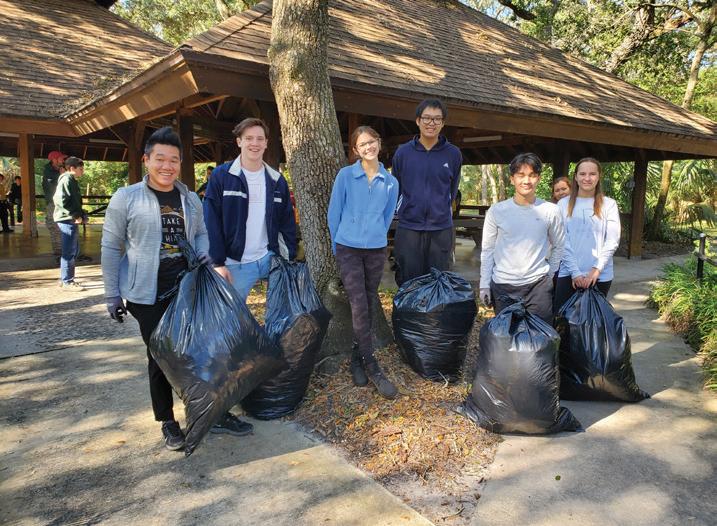
36 UNIVERSITY of SOUTH FLORIDA
Andrew Hargrove, Ph.D. (he/him and they/them)
Tina Piracci, M.S. (she/her)
Professor Tina Piracci grew up on the water and developed a love for the creatures that live just under the surface. Once she gained her scuba certification, she spent hours underwater and began to understand the dynamics of oceanic ecosystems and the importance of protecting coral reefs. “Seeing a dying reef is so sad,” she says. “The gray structures and lack of fish stand out so much from healthy parts of the ocean.”
Her concern for protecting aquatic ecosystems surfaced in her academic work as Piracci pursued a Bachelor of Fine Arts degree from the University of South Florida with a concentration in Sculpture/New Media, and three minors: Electrical Engineering, Visualization & Design, and Entrepreneurship. Her senior thesis involved the creation of a 3-D printer that used clay instead of more traditional polymer plastics, and could be used to create reef-like structures that would promote underwater growth and lead to coral restoration. She later pursued a Master of Science in Architecture at the University of California, Berkeley with an emphasis on Technology & Sustainability, and certificates in Teaching & Education, Remote Learning, and New Media. While in Berkeley, Piracci founded a makerspace in which she curated a computational design art studio which explored international partnerships with leading experts in the fields of art, engineering, and architecture.


The combination of art, design, technology, sustainability, and community engagement drive all of Piracci’s work in her personal art practice, as well as her Honors course pedagogy. In her first semester with the Judy Genshaft Honors College, Piracci offered a studio-style

course called “Art in Motion” in which students study energy as an ever-present force for action and create kinetic artworks by attaching tiny motors to paper origami forms. The result is brilliant: paper dragons that slither in place, a tiny alligator that can chomp, and a peacock that slowly fans its feathers. Piracci uses the same technology in her own work, some of which is currently featured at the Fairgrounds St. Pete immersive art exhibit. The work, entitled “Ballet of the Final Anthozoans” choreographs the wondrous phenomenon of coral spawning.
Piracci’s future courses will engage students in her 3-D printing work through several collaborations with local partners, which provide hands on research activities and the ability to implement practical solutions to current challenges. In partnership with Dr. William Ellis, Professor of Environmental Biology, students will learn how to print beautiful and effective oyster restoration bricks that will be planted in Pinellas County.
In addition to courses, Piracci is planning experiential learning opportunities, including a study away program to the Florida Keys to participate in Coralpalooza, an event hosted by the Coral Restoration Foundation. The program will include scuba diving trips to monitor, transplant, and propagate corals. She is also developing a study abroad program that will partner with Potters for
FACULTY
Peace, in which students will deliver 3-D printers to remote communities to make ceramic water filters and cook stoves.
“3-D printing is a sustainable tool of accessibility, creativity, and economic solutions. The printers are increasingly accessible, and the skill level required to use them is no longer a roadblock. The parts and software are constantly evolving to make the technology easier to use for everyone,” says Piracci. Her passion for sustainability, technology, and design are infectious, making her courses popular amongst students. “I’m only one person,” she says about her decision to choose a career in teaching rather than research or non-profits. “As a professor, I can educate the next generation to explore these issues and potential solutions. They will have a greater impact than I ever could alone.”
Check out student projects for Prof. Piracci’s Art in Motion class!

JUDY GENSHAFT HONORS COLLEGE 37
Flipping the Focus: Honors Faculty in the Hot Seat
BY DR. CATHERINE WILKINS, ASSOCIATE PROFESSOR OF INSTRUCTION
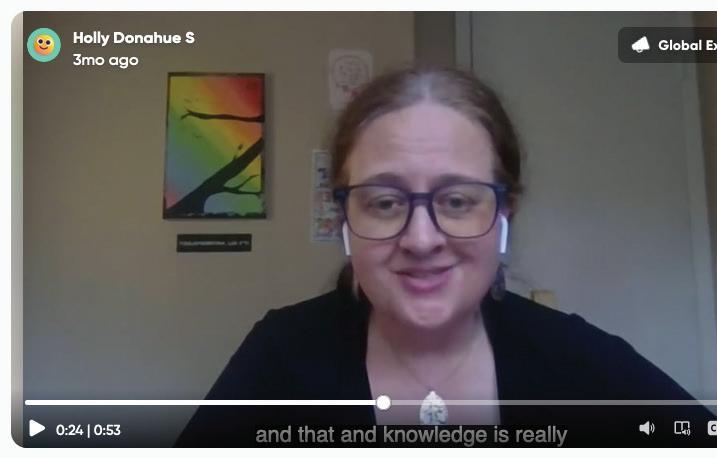

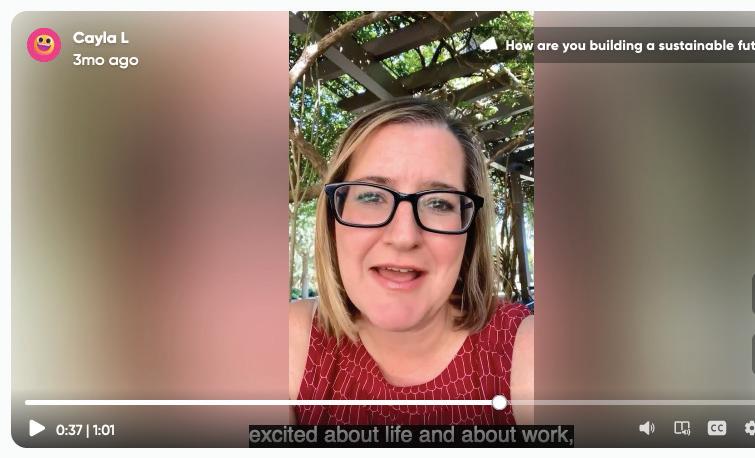
THE FACULTY OF THE Judy Genshaft Honors College are a diverse and dynamic team, with academic backgrounds in fields as disparate as Physics and Anthropology, and hometowns from Nagoya, Japan, to Westtown, New York, and everywhere in between. In the JGHC, faculty let their differences stimulate their curiosity and inform boundary-breaking creative collaborations. Always eager to learn from each other, faculty decided that a fun Flipgrid Q&A would be the perfect way to share more about their professional and personal interests, with each other and with our Mosaic readers.
Topics discussed included pillars of our Honors identity, such as sustainability, global engagement, and service. Dr. Lindy Davidson reflected on her Medical Humanities courses, and how they lead students to critically evaluate current conceptions of health and healthcare and consider how “to sustain ourselves in a way that really helps us to live well.”
For Dr. Andrew Hargrove, creating a sustainable future involves “building up my students and colleagues” and their capacity for environmental and economic problem-solving in our complex world. Dr. Catherine Wilkins agreed that mobilizing the skills and knowledge that everyone in a classroom possesses is a powerful way to provide service to the community that is more impactful than episodic volunteering. Indeed, as Dr. Cayla Lanier pointed out, opportunities for service are everywhere – from the grocery store parking lot to the rural villages of the Dominican Republic where, she said, “I take cold bucket showers and sleep under a mosquito net,” when working with students at a mobile medical clinic.
Many of our faculty have not only traveled to foreign countries but have lived abroad as well. Dr. Holly Donahue Singh, who spent many months in India as a researcher, says, “To me, global experiences are crucial, because they help us recognize our common humanity and…common challenges.” Prof. Atsuko Sakai fondly reminisced about using the ham radio as a teenager in Japan to connect with people in faraway places, sparking an interest in travel that led to her visiting 14 countries, then settling abroad here in the United States.
Honors faculty opened up about other personal subjects, and how they inform their choices for their lives. For instance, when asked how she would spend a windfall sum were she a wealthy philanthropist, Dr. Ulluminair Salim spoke about her experience caring for her mother at the end of life being the inspiration to create programs “to be able to provide respite” for caregivers of chronically ill people. Dr. Benjamin Young talked about the porous boundaries between work and play in his life, explaining how following his curiosity is intrinsically rewarding and restorative even if it looks like research from the outside. Prof. Tina Piracci agreed; for her, art making isn’t just part of her job – getting to express her creativity is a “major outlet” for restoration and mental stimulation.
Although Honors faculty are clearly passionate about their professions, there are other ways they like to have fun. One of the most laughter-filled subjects discussed was favorite concerts they either attended (from Kiss to Coheed and Cambria) or actually performed!
To find out which faculty member shone in the spotlight, and to hear all our interviews in their entirety, scan the QR codes.
38 UNIVERSITY of SOUTH FLORIDA

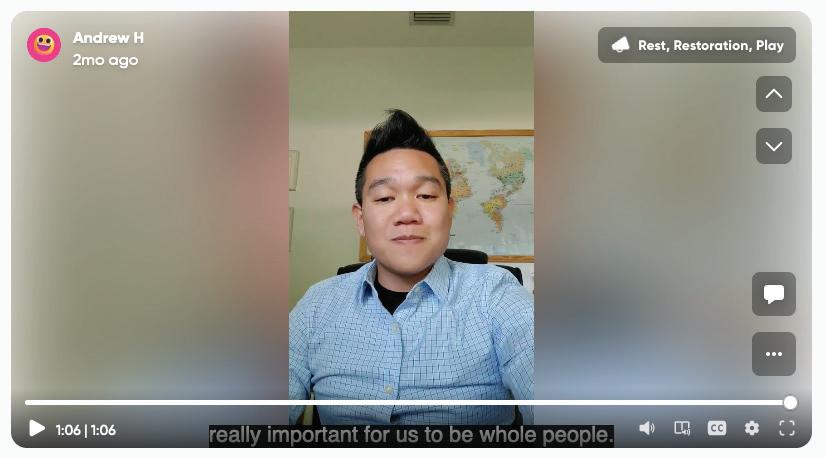






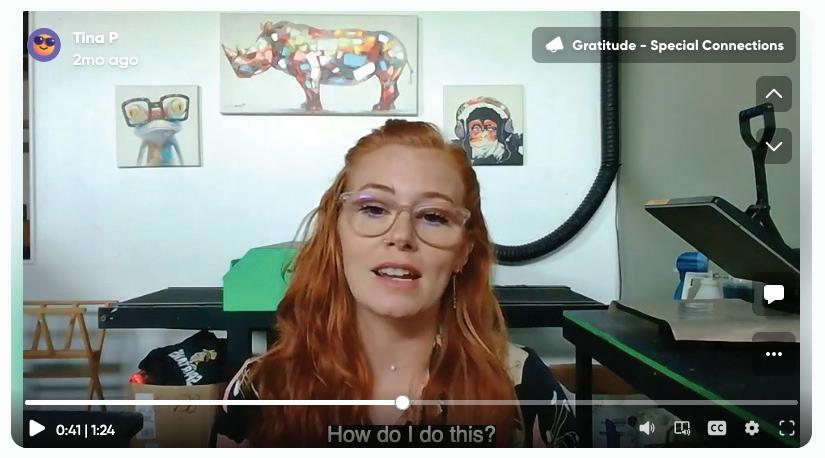






JUDY GENSHAFT HONORS COLLEGE 39 FACULTY
Flip: Philanthropy Flip: Service Learning
Flip: Concerts
Flip: Global
Flip: Sustainability Flip: Work/Play
Teaching Poetry, Teaching Life I
BY DEEPAK SINGH, HONORS AFFILIATE FACULTY
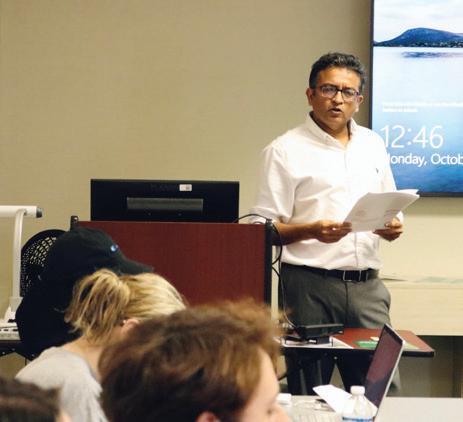
’M A WRITER, RADIO PRODUCER, and journalist. I have written for The New York Times, The Boston Globe, The Atlantic, NPR, and The World, and am the author of two books: Chasing America: Of Lollipops, Night Clubs, and Ferocious Dogs, and How May I Help You? An Immigrant’s Journey from MBA to Minimum Wage
And for the last three years, I’ve been engaged in the rewarding work of teaching creative writing at the Judy Genshaft Honors College. My courses include an Honors Capstone on the craft of storytelling and the practice of taming the inner critic, an Arts and Humanities course on travel writing, and, most recently, a course called Refined Imaginations: A Poetry Workshop.
To build familiarity with the genre, we spend the first half of the semester reading works of several poets and analyze their work closely. In the second half of the semester, students write poems that are then workshopped in class. Everyone reads everyone’s work and gives constructive feedback. I try to create a comfortable environment in the classroom, where students feel safe to write about their feelings and express their thoughts freely. By the end of the semester, the students will have written around a hundred poems combined. I’m humbled by the quality of work they have produced so far, some of which is included to the right.
So many of our students pursue degrees in the sciences and use rational thought and logical reasoning in their academic work on a daily basis. But at the same time, they have thoughts, feelings, and emotional reactions to their experiences. This writing workshop creates a structured space for engaging in creativity as both an academic and expressive practice. They kindle a passion for writing through exploring topics outside of their regular course load. As a result, they build skills that carry over into the rest of their lives: accepting and giving feedback, engaging in personal reflection, and writing about themselves.
Here’s what a couple of students in my class have to say about the poetry workshop:
“As a first-semester freshman, I was given this poetry workshop class with Professor Singh simply to fill up my schedule. At first, I had my doubts, as in high school I did not have the most enjoyment with poetry. However, the creativity that the workshop and Professor Singh have given me has allowed for this to become my favorite class, as work does not feel like work, but rather a chance to write freely in ways that I was never able to do before.”
– Marc Schwartz, ‘25
“Refined Imaginations: A Poetry Workshop is one of my favorite classes I have taken at USF. It is a great opportunity to engage in learning with students of all disciplines, and a space to read and analyze poetry, writing it and reflecting on it. It is a class where you get a chance to listen to other people’s thoughts on poetry and share your own, a class that feels warm and never judging, with accepting classmates and an amazing professor. It is a class that creates memories (and poems!) for life.”
– Dana Ardasenova, ‘25, international student from Russia
Musings of a Starving Woman
BY FELICIA NGUYEN, BIOMEDICAL SCIENCES, CLASS OF ’25
Are there things I miss out on in life, because of my womanhood?
If I could go for a run through the dim forested trails, is there knowledge that the foliage whispers of, a wisdom the creatures possess?
If I could walk the streets alone at night, would I find there, in the still, a sense of peace that my mind has been wandering for all its life? The thought gnaws on my bones in hunger. What secrets would the breeze carry in, blown into my quiet room, with a hush and a touch of mindless fate, if my windows could be flung wide open? what if, what if, what if
Toothpick Trees
BY SAMUEL MEMOLI, BIOLOGY, CLASS OF ’25
Rustling all about the forest’s pocket
Are countless, skinny, toothpick trees
Leaves step over seeds to get into the rocket
To go so tall they pick the sky’s teeth
The sky smiles back and thanks distantly
The trees who grew so much
And tried so hard, admittedly
To earn a single brush of the sky’s touch
The seeds, abandoned together, cry Entirely forgotten on a skyless ground
The trees can’t possibly see just why When the sky, to them, is all around The trees, forever more will reach So the seeds can die, or choose to leave.
40 UNIVERSITY of SOUTH FLORIDA
Poems from the workshop, shared with permission from the authors
Teaching and Learning by Mentoring an Undergraduate Researcher
BY DR. NANA TUNTIYA, HONORS AFFILIATE FACULTY

RESEARCH IS A CORE COMPONENT of the Judy Genshaft Honors College experience. Students can engage in the process of selfdirected study of a topic of interest through a two-semester Honors Thesis project, as well as short-term, smaller projects. In this article, Dr. Nana Tuntiya, Honors Affiliate Faculty, shares her experience mentoring a student and why the experience can be as impactful for the faculty as it is for the student.
AS A FUTURE OPTOMETRIST, Vrunda Patel is enthusiastic about promoting eye health awareness, especially in young children. I originally met her as a student in my Honors Health, Illness, and Society class, where her interest in health care coincided with my specialization in medical sociology. After the class ended, she asked me to advise her Honors Thesis, which focused on improving eye health awareness amongst elementary school children.
After successfully completing her thesis, she wanted to further expand the project to focus on a specific finding from her research that warranted additional attention. In the spring semester, Vrunda enrolled in the Honors Undergraduate Research (IDH 4910), as I continued to mentor her research. During this self-directed, independent study course, she focused on the impact of digital devices on eyes, a developing area of interest among medical professionals. This is because young children have higher rates of exposure to technological devices as they use them starting at younger ages and for increasing amounts of time than was typical in previous generations, making this a subject of considerable public health interest as well.
Honors Undergraduate Research combines the benefits of experiential education and valuable one-on-one mentoring. This format also suits shorter projects as it is completed over a course of a single semester. The expected outcome of the research plan is determined in the initial consultations with the faculty advisor, which creates flexibility to adjust the project as needed. For instance, when I learned about the upcoming USF Undergraduate Research Conference, I suggested that
Vrunda develop a poster to present her Honors Thesis at the conference. Her project Creating Eye Health Awareness in Students: Developing a Teaching Curriculum and Educating Elementary School Children received an Honorable Mention in General Disciplinary Awards (Health Sciences) – a memorable highlight of her undergraduate career.
This is an excellent example of why Honors Undergraduate Research is so compelling. By electing Honors Undergraduate Research, my student was able to study the topic she’s passionate about, while meaningfully contributing to her own education and advancing her skill set. From a faculty standpoint, it is rewarding to watch your students blossom into more independent, mature researchers.
Mentoring undergraduate research contributes to my own learning, as well. I enjoy the ebb and flow of the weekly meetings when new findings emerge, and the focus of the research is continuously sharpened as more studies and ideas are considered. Through my students’ research, I am exposed to literature outside of my immediate area of expertise, expanding my own familiarity with the topic. Both of our skills are sharpened through this back-and-forth collaboration.
Indeed, the impact of undergraduate research extends well beyond labs and conferences; it’s personal. As I sat down to write this, I reached out for my blue light filtering glasses, a purchase I felt compelled make after considering the importance of eye health while reading the drafts of Vrunda’s project!
JUDY GENSHAFT HONORS COLLEGE 41 FACULTY
Foundations for Future Success
BY ALLYSON COUSINO, HONORS ADVISOR
THIS FALL, WE WELCOMED
639 first-year students to the Judy Genshaft Honors College on the Tampa campus! As part of their journey in the Honors College, all first-year students on the Tampa and Sarasota-Manatee campuses complete a 10-week course titled Honors Foundations taught by our very own upper-class Honors students, Peer Mentors. Honors Foundations serves as a community-oriented classroom environment for our first-year students to build connections with their fellow Honors peers, and understand the resources and opportunities available to them as Honors students at USF.
When asked how he would describe Honors Foundations to an incoming Honors student, Maxwell Ungrey, Cell and Molecular Biology, stated, “Honors Foundations is your roadmap to navigating the Honors College. After taking the class, you’ll know with confidence every step you need to take to gradu-
ate with honors and continue to be a lifelong learner.” Throughout their time in Honors Foundations, students learn about topics such as academic success, financial literacy, health and wellness, campus involvements with research and study abroad, professionalism and career readiness.

The Peer Mentor and Peer Mentor Lead positions also provide valuable leadership opportunities for upper-level Honors students to share their knowledge and experiences with the next class of JGHC students by teaching their very own class. Second year student, Chad Hosein, Electrical Engineering, describes his experience in the Peer Mentor position as “a great opportunity to share your knowledge with incoming students. Not only do you form a special bond with your students, but you also build your own interpersonal and public speaking skills. The added benefit of working alongside other Peer Mentors is amazing because you can hear new ideas for your class and get inspired to do new things with them.”
Through formal training and intentional support, Peer Mentors are given the tools they need to successfully develop their own lesson plans and teach their own group of first-year students. Divya Patel, a senior Psychology and Criminology double major, describes her experience as a Peer Mentor Lead position as “a support system that helps you navigate through not only personal matters but builds you up professionally as a student leader.”
The key to success for this program is our belief in our students to meet the high expectations of the program. We instill trust in our Peer Mentors to guide our new students through their first semester on campus. They are often the very first face of the Judy Genshaft Honors College to many of our new students. Without fail, our Peer Mentors take this responsibility seriously and exceed our every expectation. Each year the program and curriculum evolve to incorporate the contributions of our Peer Mentors, keeping the course relevant to our incoming freshmen and ensuring a meaningful leadership experience for our mentors.
42 UNIVERSITY of SOUTH FLORIDA
Building Relationships with Honors Advising
 BY CARTER HARBERT, HONORS ADVISOR
BY CARTER HARBERT, HONORS ADVISOR
SPECIALIZED ADVISING IS ONE of the many terrific resources available to students in the Judy Genshaft Honors College. Every new student is paired with an Honors advisor that specializes in a specific academic area in order to provide both academic and career planning. From picking courses and providing tips on time management to finding internships and applying to graduate school, Honors advisors bring a wealth of experience, care, and personalized attention to encourage success at USF and beyond. In addition, Honors advisors also play an active role in the greater JGHC community. You can find them participating in study abroad trips, joining in Student Council picnics, helping in the Living Learning Communities, and more. We believe that advising occurs in every interaction with students, whether we’re in the office or elsewhere on campus. The result is a meaningful learning relationship that helps students acclimate to the university and find the confidence to identify and pursue their goals. When they do, we’re there to celebrate every milestone! Don’t just take our word for it — these comments from our anonymous advising survey share students’ perspectives about what Honors advising means to them.
• “The advising team is truly a positive force to be reckoned with and I am so thankful that more than one of them have taken me under their wings. As a group, they have helped me though nearly every step of my college career, and I am so thankful for that.”


• “The entire JGHC advising team is impeccable, with each individual member dedicating themselves to the success of the JGHC and of each student they encounter. They are the most kind and loving bunch.”
• “The advisors of the JGHC were perhaps my most utilized and valued resource
during my time at USF. Going through undergrad, there were always times when things came up regarding course registration or my career goals. By working with my advisor, I was able to build rapport with an advisor during all four years and he helped me to accomplish my goal of getting into medical school.”
• “The close-knit aspect of the Honors College allows for a comfort with advising that I think is unique in the university setting. The team is really invested in the life of the students and very available to help while also ensuring that the students are not reliant on others for making their decisions. It’s a big part of the maturity gained in college and I think the advisors navigate that very well.”
• “My JGHC advisors were a huge asset towards my success and extracurricular involvement during my time at USF. While my degree-specific advisor was wonderful, I found myself more involved with my JGHC advisors because of the personalized touch they provided that not only applied to my degree, but my involvement with the Honors College itself. They were always accessible, always friendly, and always had my best interests in mind.”
• “JGHC advising is the safe place I can always return to seek advice in my academic, sometimes even private and professional life. With an individual and compassionate approach, my advisor not only helps me with making the best choices and finding crucial resources and people but also provides great emotional support and understanding.”
•“I sincerely enjoyed having someone to talk to when I needed academic guidance as a student, and my advisor was always approachable. Her coaching has helped me gain clarity and meaning in goal setting. It’s always a pleasure working with her!”
• “Without my Honors College advisor, I would not have known that an opportunity to apply for a national scholarship existed and that I would be a good candidate for it. Additionally, I felt that I could visit many of the other advisors and they helped me make decisions regarding applying to graduate school between undergrad and medical school, study abroad opportunities, and extracurricular activities.”
• “My advisor has had such an incredible impact on me. She is both a friend and an amazing mentor. She helped me emotionally and academically through the passing of my father and she has helped cement my place in the JGHC as well as USF.”
JUDY GENSHAFT HONORS COLLEGE 43
Braunstein (left)
Harbert (left)
Banke (center)
Salem Scholars Making an Impact

Having lost my sight as a teenager, I learned the wonderful benefit of a higher and postgraduate education. We are confident that the limitless power of innovative and creative minds coupled with a great education will lead to ideas that will bridge the gap between the able-bodied and those of us with a disability.”
– Richard Salem, CEO Salem Solutions
44 UNIVERSITY of SOUTH FLORIDA
“
Richard and Jule Salem, middle back row, pose with Grand Challenge participants.
BY AMY HARROUN
ACCORDING TO THE WORLD HEALTH Organization, “1.3 billion people – or 1 in 6 people worldwide –experience significant disability.” In Florida alone, there are 5 million adults with disabilities, 70% of whom are under- or unemployed. Focused on reducing the impact of individual challenges of those managing life with a disability, as well as on the community at large, the Judy Genshaft Honors College is making significant strides through innovation in a wide variety of fields.
Through the Salem Scholars Program, students in the Honors College have had the opportunity to develop their own ideas to make a positive difference in the lives of persons with disabilities, their families, and the communities in which they live.
Founded in 2019 with funding from Richard and Jule Salem, the program hosts a Grand Challenge Competition each year to identify the next cohort of Salem Scholars. Richard Salem understands first-hand the importance of supporting those living with disabilities. “Having lost my sight as a teenager, I learned the wonderful benefit of a higher and postgraduate education,” says the distinguished local attorney and CEO of VASTEC, a digital data transformation company. “We are confident that the limitless power of innovative and creative minds coupled with a great education will lead to ideas that will bridge the gap between the able-bodied and those of us with a disability.”
To harness this potential, the Salems partnered with the Honors College to create a competition to address “grand challenges” such as accessible technologies, food insecurity, lack of education, and inequality. It encourages students to create innovative, meaningful solutions to address these and other barriers confronted by the disability community.
“It started with a walk along the Terrell Sessums Mall,” which was named in honor of the Salems’ longtime friend and law partner, “that led to a visit with Dr. Lindy Davidson’s class,” says Richard Salem. “We met some of her students and were inspired by their interest and enthusiasm in how they wanted to contribute to the quality of life for people with disabilities. It was gratifying to learn more about their understanding and willingness to address the needs of persons with disabilities. That was a defining moment for both of us. Jule and I met with Dr. Charles Adams, Dean of the Judy Genshaft Honors College, to explore ways in which we could support the excellent work of these students, as well as those that follow in years to come.”
The Grand Challenge competition assists students with the process of advancing an idea through the concept and development stages with an eventual goal of putting those ideas into practice. “It has been so wonderful working with the Salems
on this program,” says Davidson, Associate Dean of the Judy Genshaft Honors College. “We share a disappointment that disability research often does not result in tangible outcomes. The Grand Challenge competition addresses this by funding the steps necessary to turn meaningful ideas into reality.”
To participate, students form teams and submit proposals for addressing the selected challenge. The top teams progress to the next round where, after receiving feedback, they pitch their ideas to a panel of judges who award a winning team with the Salem Scholarship and the opportunity to develop their concept into a reality with financial and mentorship support.
“It’s just amazing to see the creativity and ingenuity that goes into the students’ ideas each year,” says Jule Doran Salem, Managing Director of Salem Solutions. “I give the judges credit and am glad we are not the ones who need to choose the winner. They are all so good!”
Regardless of whether they are selected as Salem Scholars, the Grand Challenge participants all benefit from the process. “They have thought-provoking conversations with their peers and learn how collaborative teamwork can advance their understanding of both disability issues and innovation,” says Davidson.
The Salems look forward to the competition each year and enjoy working with the students.
“We have a deep-seated and genuine interest in the advancement of social inclusion, civic engagement, and employment for persons with life-altering disabilities,” says Richard Salem. “This competition is designed to support those important initiatives.”
Salem Scholars have already made their mark on the world. Through the program, scholars have presented at the Global Health Catalyst Summit in Washington, D.C. In addition, Kevin Nguyen, a 2020 recipient and Rhodes Scholarship semi-finalist, created a team to launch his idea on the global scale, developing an international curriculum for disability awareness and accommodation in education that will be used in both Bangladesh and Vietnam.
“This work is a great example of why the Salem Scholars program is so important,” says Adams. “The Grand Challenge competition provides our students with support, guidance, and networks to advance ideas that can have lasting impacts for those living with disabilities. We are very grateful to Richard and Jule for their support of this meaningful work and are excited to kick off the fifth year of the program.”
JUDY GENSHAFT HONORS COLLEGE 45
PHILANTHROPY
Signature Events

This September, the Humanities Institute and the Judy Genshaft Honors College welcomed scholar, poet, translator, and Honors College alumnus (class of 2003), Daniele Pantano, for a week of class visits, workshops, and readings on campus with students and faculty. Pantano is a Swiss poet, essayist, literary translator, artist, critic, editor, and publisher. His poems, essays, and translations have appeared widely, and his poems have been translated into a dozen languages, including Albanian, Farsi, French, German, Italian, Kurdish, Russian, Slovenian, and Spanish. During his visit to USF, Pantano visited Honors courses and held a public reading from his latest book.
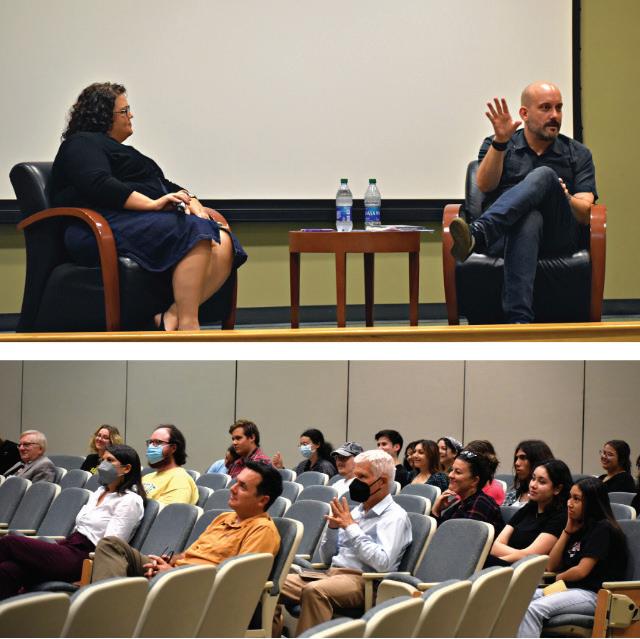
The Judy Genshaft Honors College welcomed 13 new students at the annual Honors Convocation on the Sarasota-Manatee campus. Cayla Lanier, Assistant Dean on the Sarasota-Manatee campus, kicked off the event by introducing this year’s theme, “Together Toward: Sustainable Futures,” and inviting students to address challenges at the intersection of sustainability and disability. In his keynote address, Rod Hershberger, former CEO and chairman of PGT Innovations shared life lessons from his upbringing to inspire students to chart their own paths towards creating sustainable futures.
Each year, students team up with Honors faculty and advisors to compete at the JGHC Student Council Brain Bowl. Student Council members selected questions spanning a wide range of categories from history to science to pop culture and facilitated the trivia event to ensure fair play for the fierce competitors. The winning team was awarded the Brain Bowl (an actual bowl!) and holds bragging rights for the rest of the year.
The Honors Living Learning Community hosts an annual Tapas Night to build cross-cultural awareness and to promote our study abroad opportunities. This year, faculty from our 10 Honors International Programs and community partners connected with students to make them aware of programs in the Tampa Bay area and beyond. Students enjoyed snacks and drinks from the host countries of our study abroad programs including Italy, Germany, Poland, the UK, South Korea, Ghana, and the Dominican Republic.
The Honors Fall Picnic, held at USF’s Riverfront Park, is the longest running tradition of the Judy Genshaft Honors College. Judy Genshaft Honors College Student Council leaders facilitated the event, providing an opportunity to welcome all students to a new academic year with canoeing, games, and

46 UNIVERSITY of SOUTH FLORIDA
Pantano visit
Tapas Night
Brain Bowl
Spring Concert

social activities. Participants enjoyed burgers, hot dogs, and vegan-friendly patties grilled with special care by Honors faculty and advisors!
Dance Marathon is a much-adored annual event at USF run by the student organization Bulls for Kids, supported by the JGHC Student Council Volunteer Committee. The goal is to raise money for kids receiving treatment at Shriners Children’s Hospital. Hundreds of participants flock to the Marshall Student Center to dance all day to honor the children and families. This past year, the Volunteer Committee danced, participated in escape rooms, and contributed to the $60,254 raised. They also won the “most spirited department” award.
In St. Pete, we march to the beat of a different drummer...or tambourine...or kazoo in our annual Convocation. To celebrate the start of a new academic year, students boisterously processed from the Honors College home base in the historic Snell House to the student center, making motley music all the way. Once there, students, faculty, and staff gave remarks on the importance of community, connection, and service in defining our campus identity. The event was a great reminder that, “You can’t beat the Pete!”

JUDY GENSHAFT HONORS COLLEGE 47 THE COLLEGE
St. Pete Convocation
NEW NAME, CONTINUED SUCCESS FOR THE OFFICE OF National Scholars
BY THE MOSAIC EDITORIAL BOARD AND DR. SAYANDEB BASU, DIRECTOR OF THE OFFICE OF NATIONAL SCHOLARS
EACH YEAR, THE OFFICE of National Scholars (ONS) mentors and advises hundreds of high-achieving USF students through the competitive national scholarship application process. This past year, the office underwent a name change (previously Office of National Scholarships) to better reflect its purpose-driven mission. Our Mosaic editorial team caught up with ONS Director, Dr. Sayandeb Basu, to reflect on the name change — and a decade of student-focused success.
How has the Office of National Scholars impacted USF and the Honors College over the past 10 years?
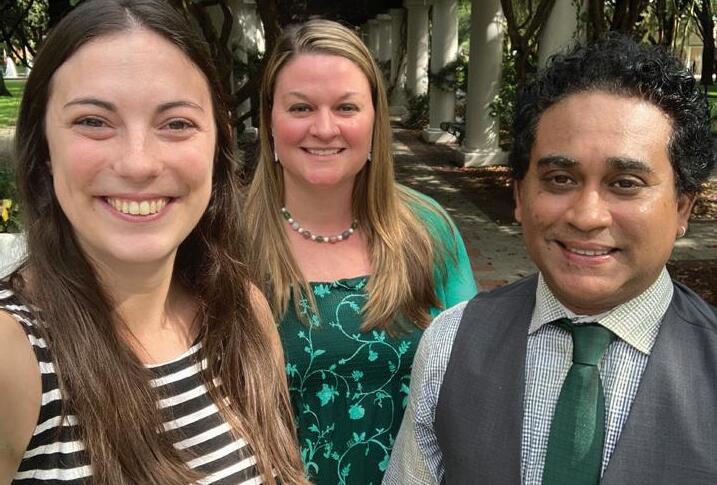
Over the past 10 years, thousands of students have met with ONS and hundreds have become national scholarship recipients. The number of students receiving the Barry M. Goldwater Scholarship [focused on research], Benjamin A. Gilman Scholarship (focused on study abroad), and the Fulbright U.S. Student Program [focused on international education] has risen steadily over our tenure. Last year, 98 USF students received national scholarships and fellowships. Just the past two years have brought a record number of finalists for the office — students who have become finalists for the Marshall Scholarship and the Rhodes Scholarship, two of the most prestigious and well-known national scholarships in the world.
Then why the name change and why now?
The word scholarships has misrepresented the purpose of the office since its
inception in 2011. Students and faculty have mistaken our purpose for a longtime because of our previous name and its innate ties to funding. ONS provides high touch-mentoring to help students bring their passions to fruition through practical steps. We focus on scholar development. This, and not merely helping students to secure funding, is our purpose.
So, your work hasn’t changed?
The day-to-day work at ONS will always be the same. Our work involves mentorship, coaching, and the ability to connect and nurture students through the national scholarship application journey at USF and beyond. We strive to support students while they envision their future goals, engage with opportunities, and excel as they move forward in their lives. We maintain a schedule of workshops, working group meetings, and internal deadlines for all applications. Even though funding is a part of national scholarships and fellowships, students are transformed by meetings with the office, where advisors speak with them
about their passions and how to transform those passions into short-term and long-term goals. ONS takes pride in mentoring students to create the most impactful and competitive applications for nationally prestigious awards.
Are there any recent student success
stories that stand out?
We have many amazing alumni stories to share. Students like Shahriar Zamani, who will complete his Ph.D. in Medical Sciences from the University of Cambridge in June 2023 and will begin a post-doc at the National Cancer Institutes shortly thereafter. Hiram Rios Hernandez, who just completed a post in Myanmar, as a Public Diplomacy Foreign Service Officer for the U.S. Department of State. Mabel Proenza, who recently returned to the U.S. from Spain, where she taught English for a year with the Fulbright Student Program U.S. ONS is excited to see what is next for our students!
48 UNIVERSITY of SOUTH FLORIDA
Lauren Roberts, Lauren Chambers, and Sayan Basu



JUDY GENSHAFT HONORS COLLEGE 49 SCHOLARS
358 Gilman Scholars 71 Fulbright Program Recipients 42 Critical Language Scholars, Boren Scholars, and Boren Fellows 34 NSF Graduate Research Fellows and Honorable Mentions 21 Goldwater Scholars and Honorable Mentions 11 Fulbright UK Summer Institute Recipients 12 Hollings Scholars 10 Florida Gubernatorial Fellows 4 Rangel Fellows 3 Phi Beta Kappa Key Into Public Service Scholars 2 Pickering Fellows 2 Gates Cambridge Scholars 1 Marshall Scholar 1 Knight-Hennessy Scholar 5 Truman Scholarship Finalists 3 Marshall Finalists 2 Schwarzman Finalists 1 Rhodes Scholarship Finalist
ONS: A DECADE IN NUMBERS
Shahriar Zamani
Mabel Proenza
Hiram Rios Hernandez
A LEGACY OF ACHIEVEMENT: REFLECTING ON THE Provost’s Scholars Program
BY AMNA WAJAHAT, PROVOST’S SCHOLAR, BUSINESS ANALYTICS, CLASS OF ‘24
THE PROVOST’S SCHOLARS PROGRAM (PSP) is a professional and personal development program designed for highly motivated, high achieving students with clear career goals who are driven to graduate from the University of South Florida within three years. In addition to their coursework, scholars are also expected to develop their professional portfolio through study abroad, research or professional development, and service or leadership.
My two years as a Provost’s Scholar have been nothing short of remarkable. During the Fall 2021 Welcome Back Dinner, I connected with university leadership, including President Rhea Law, Provost Emeritus Ralph Wilcox, and Dr. Charles Adams, Dean of the Judy Genshaft Honors College. Earlier this year, I participated in a global technology internship with a focus on web development to gain professional exposure, and volunteered with Feeding Tampa Bay, learning about food insecurity challenges and solutions. This May, I will fulfill the program requirements by studying abroad in South Korea with my classmates in the Judy Genshaft Honors College.
The Provost’s Scholars Program was created and supported by Provost Ralph Wilcox to offer unique opportunities and guidance to a select group of students committed to a comprehensive educational experience during a condensed time at USF. Earlier this year, we celebrated Dr. Wilcox’s return to faculty after a highly accomplished tenure that has resulted in USF’s academic enterprise earning widespread recognition across the state, nation, and globe. His leadership, commitment, and tireless contributions to the Provost’s Scholars Program and the University of South Florida will always be treasured. I was delighted to interview him for this article and hear his reflections on the program that has meant so much to me.
You have guided the academic planning, implementation, and accountability initiatives that have perennially positioned USF among Florida’s highest performing institutions. What purpose, aspirations, and past experiences inspired you to establish the Provost’s Scholars Program 11 years ago?
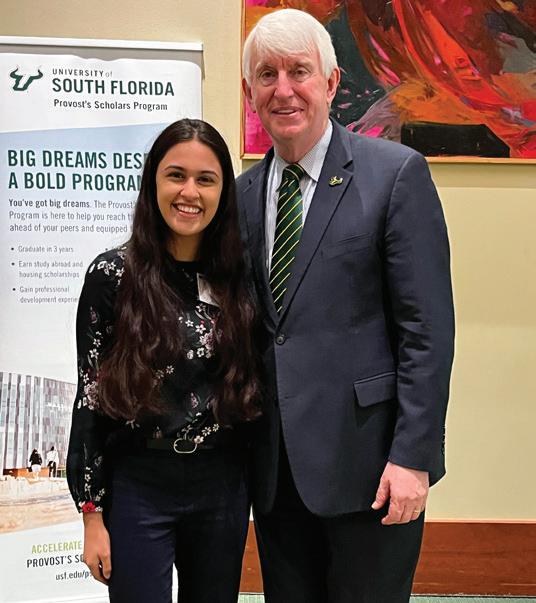
The Provost’s Scholars Program (PSP) was first introduced in Fall 2011 in response to student demand. With more and more diverse and talented students selecting USF as their chosen destination, many arrived on campus having already completed college credits with a clear vision and desire to earn their baccalaureate degree in three rather than four years.
Of course, this was not a program for all students even though it promised considerable savings and an accelerated path to graduate school, professional programs, or early entry to the workforce. Ever cognizant that a university education should represent much more than the successful completion of prescribed credits leading to the acquisition of knowledge and technical skills, emphasis was placed on the nurturing of core skills essential to future success including critical thinking, adaptability, self-awareness and emotional intelligence, active listening and effective communication, leadership and interdisciplinary teamwork, creativity and problem solving.
What inspired you to pursue a career in academia? When/how did you discover academia was the career path for you?
As the first in my family to attend and graduate from college, I was fortunate to have been encouraged by my teachers to continue my education beyond high school. Raised in a family that valued both education and public service, I was always curious and passionate in the pursuit of truth and in seeking answers to the betterment of society. The opportunity provided by higher education to think both critically and creatively, to develop and present novel solutions to complex problems, as well as to both mentor and learn from students, staff, faculty colleagues, alumni, and community leaders, cemented my path in academia.
How did being a first generation college student impact your experience? How did this perspective inform your work as a professor and administrator?
As an undergraduate student I entered a British higher education system characterized by long held traditions and an innate resistance to institutional change. At the time, access to British universities was limited mostly to the children of university
50 UNIVERSITY of SOUTH FLORIDA
Amna Wajahat poses with Provost Emeritus Ralph Wilcox.
graduates, perpetuating class stratification, and I found myself in a noticeable minority. Nevertheless, I was encouraged to bring my background experience and perspective to the classroom, to community engagement, and even to challenge long held assumptions through my research.
This experience allowed me to develop an awareness and career-long sensitivity to what student success demands. Regardless of one’s intellectual capacity and appetite to excel academically, it became clear to me that without parents or siblings who had previously navigated the collegiate path, progress to graduation was far from guaranteed.
You have driven unparalleled gains in student retention and completion rates, eliminating achievement gaps on the basis of race and socioeconomic status. As Provost, what steps were taken to foster diversity and inclusivity on campus?
Arguably USF’s greatest accomplishment in student success over the past two decades extends far beyond the remarkable gains in student retention, graduation and placement rates, accompanied by significant declines in student loan indebtedness, as we realized broader representation and notable achievements on the basis of race and ethnicity, socioeconomic status, geographical and cultural background. A central hallmark of USF’s student success movement has been the opportunity provided to students who demonstrated the scholarly aptitude to succeed with equitable support structures afforded to all. Not only did this integrated approach model my lived experience by putting prior assumptions aside, but it supported the calls we heard from employers and graduate schools to provide a steady and diverse pipeline of talented graduates who were well-prepared to succeed in the workforce and postgraduate programs.
Your impact on USF is undeniable. What hopes do you have for the continued success of our academic institution?

There is no doubt in my mind that USF’s future is bright. That we have been celebrated as the nation’s fastest rising univer-
sity, public or private, over the past decade is a testimony to the creativity, dedication and hard work of so many talented faculty, staff, and students who were both intentional and tireless in their efforts. USF’s strategic plan provides a rightfully ambitious and exciting blueprint for the university’s continued upward trajectory. Grounded in the core values of inquiry, innovation, integrity, and inclusion, the plan prioritizes “access, success, and social mobility for a diverse and talented student body… excellence in research… a mutually beneficial partnership with our communities… [and] a destination of choice and a collaborative community of diverse and talented faculty, staff, and students.” I very much look forward to witnessing USF’s continuing progress in my next professional chapter as a proud and contributing affiliate faculty member in the Judy Genshaft Honors College.
To close, what important life lessons have you learned that you would like to pass on to future Bulls?
Your arrival to USF represents a new and exciting chapter in the journey to personal and intellectual growth and development. It is much more than a continuation of your years in high school or state college as you satisfy your appetite for learning and search for the truth in a top tier public research university. Rigorous debate of divergent ideas, opinions, and philosophies, old and new, is essential to your education. While challenging the viewpoints of others (fellow students and professors) it is important to respect opinions, grounded in evidence, and to engage, listen, and learn from them. As such, knowledge alone is insufficient to prepare students for future success and you must continue to immerse yourself in sometimes unfamiliar, and even uncomfortable, settings as preparation for the next milestone in life.
Finally, I urge all our students to take pride in your university and, as I have sought to do throughout life, remember and support future generations of students by “paying it forward” though time, talent, and treasure.
JUDY GENSHAFT HONORS COLLEGE 51
Provost Wilcox, center, hosts students at a USF football game.
BEYOND THE CLASSROOM –TWELVE YEARS OF PARTNERSHIP, ENRICHMENT, AND FRIENDSHIP IN
Germany
BY LAUREN CHAMBERS, ASSOCIATE DIRECTOR, OFFICE OF NATIONAL SCHOLARS
FOR THREE WEEKS IN MAY 2022, 28 students traveled to Germany to engage with peers from the University of Osnabrück to improve their understanding of German history and contemporary politics and to experience German culture as few tourists do. Now in its twelfth year, this highly successful program provides students with a unique and rewarding experience. Since its inception, the “Germany Beyond the Classroom” cultural exchange program has received financial support from the Max Kade Foundation, which sponsors programs that encourage the exchange of ideas among universities in the United States and in German-speaking countries.
A Celebration Long Overdue
The highlight of the program was the 10th Anniversary Celebration, which was originally scheduled for the 2020 trip. Unfortunately, due to the Covid-19 pandemic, the program was delayed for two years until travel could return in 2022. We were all very excited to finally celebrate the 10th anniversary of the program, in its 12th year! Held at the Lagerhalle in Osnabrück, the event brought together USF students with University of Osnabrück students and staff, past and present. The founder of the program, Dr. Georg Kleine, former Associate Dean of the Judy Genshaft Honors College, travelled from his home in Germany to Osnabrück while Dr. Charles Adams, Dean of the USF Judy Genshaft Honors College, traveled from Tampa to attend the celebration. We used Zoom to include two Honors College staff members who were instrumental to the development and implementation of the program, Dr. Reggie Lucien and Mr. Arnie Mejias. It was a wonderful treat for Dr. Kleine and our University of Osnabrück partners to see and hear from them. In preparation for the celebration, USF students joined students from the University of Osnabrück to cook their favorite American and German foods together for a cross cultural potluck. It was impressive to see the variety of foods the students prepared in their apartment and dormitory kitchens! The celebration concluded with an awards ceremony to recognize the founding members followed by an informal reception where guests socialized, reminisced, and made new memories.
Exploring the Past
Dr. Peter Funke, Associate Professor in Political Science, joined trip leaders Carter Harbert and Lauren Chambers to offer the spring course, which focused primarily on the socio-political history of the country. Once the group arrived in Germany, there were numerous valuable opportunities to engage with these themes and to see examples of the country’s development throughout the past several centuries. In Osnabrück, the host city for the program, students learned about the Peace of Westphalia, which ended the 30-year Protestant/Catholic war in the early 17th century, and toured historical buildings and structures dating back to the 1200s. We also learned about WWI and WWII through the eyes of two Osnabrück natives, artist Felix Nussbaum and author Erich Maria Remarque. In Berlin, students saw vestiges of the divided east and west in street signs, architecture, and monuments like the East Side Gallery. We visited the Reichstag as well as several museums showcasing diverse displays of German art, innovation, and history. Finally, in Hamburg, we toured the harbor and the old warehouse district responsible for much of Germany’s international trade, even waking up at 5:00 a.m. to experience the sights, smells, and tastes of the Sunday fish market!
Contemporary Connections
The University of Osnabrück continues to be a fantastic exchange partner. As many of the JGHC students are firsttime travelers, Osnabrück is an ideal city to explore safely and independently. The university coordinates an International FaceTime (IFT) partner for each student so that USF students can establish friendships with German college peers and begin to exchange culture and language before they travel. After our students’ arrival, the IFTs join them for excursions to Münster, Bremen, and a picnic at the Rubbenbruchsee park in Osnabrück. Honors students enjoyed learning about German life and cultivating friendships through local leisure activities, visiting family homes, and even traveling as far as Amsterdam with their partners. The pairing of German students with USF students throughout the life of the program has proven to be one of its most memorable features. The University of Osnabrück also offered about 30 hours of German language classes during the program. By the end of the trip, our students were delightedly buying meals and taking public transportation using their newly acquired German language skills.
We look forward to continuing this partnership, and this model of international education, long into the future. Prost!
52 UNIVERSITY of SOUTH FLORIDA
Going Abroad


JUDY GENSHAFT HONORS COLLEGE 53
Left: USF students and program leaders pose in front of the University of Osnabrück residence hall.
Below: Students gather on top of the Bundestag, German Parliament, in Berlin.
EXPLORING GEOLOGY AND MARINE BIOLOGY IN THE Bahamas
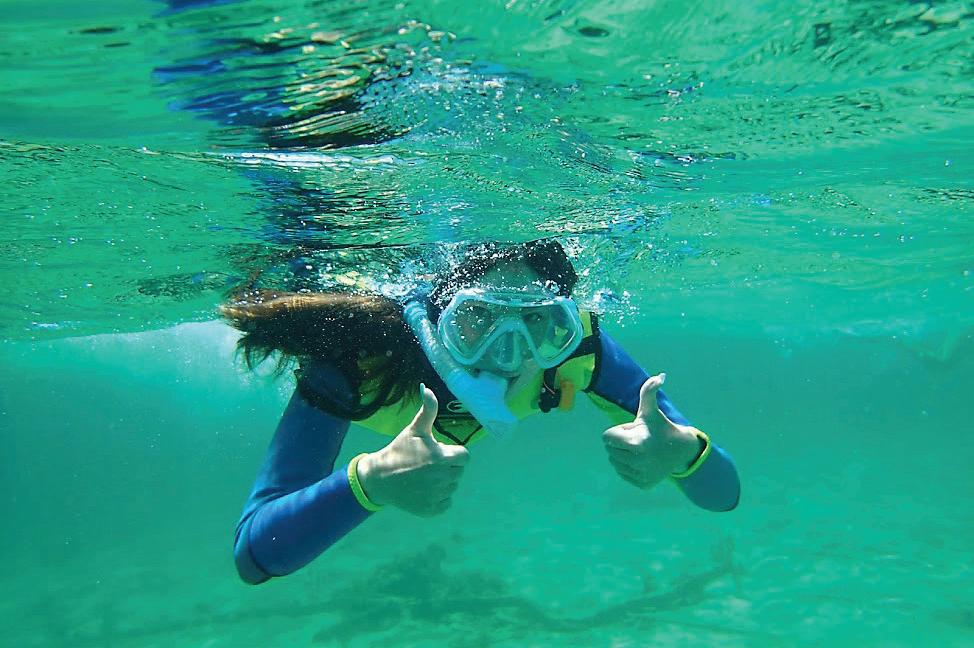 BY LAUREN ROBERTS, ASSISTANT DIRECTOR, OFFICE OF NATIONAL SCHOLARS
BY LAUREN ROBERTS, ASSISTANT DIRECTOR, OFFICE OF NATIONAL SCHOLARS
IN EARLY JULY, 12 Judy Genshaft Honors College students traveled to Andros Island, Bahamas for a study abroad course titled, “Exploring Tropical Island Environments by Land and Sea,” led by Dr. Teresa Greely, a College of Marine Science faculty member at the USF St. Petersburg campus. Andros Island is the largest island in the Bahamas with beautiful reefs and the greatest concentrations of blue holes (underwater sinkholes) in the world. The course focused on identifying local species, exploring the geology of the island, and understanding how climate change impacts the marine environment. The students spent the week snorkeling, exploring caves and blue holes, and engaging with the local community. Lectures were provided right on the beach at the Forfar Field Station, where the group also lived during the program. “Personally, my favorite part of the program was how we were immersed in nature the entire time,” shared Honors senior,
Lauren Flannery. “Since we were staying on an off-island, we were given the opportunity to learn in environments that have little human interaction and impact.”
In addition to learning about marine life and identifying species, students learned about Bahamian history and culture. They visited the Androsia Batik Factory, which was started in 1973 to share the vibrant art form with visitors and provide employment for local women. The artists handcarve stamps and apply wax to fabric before dying it to create patterns. Students also visited the Red Bays Community, a settlement started in 1821 by a group of people called the Black Seminoles. The original settlers were primarily made up of freed or escaped slaves from the Southern United States who merged with the Seminole Tribe. Most of the current residents are direct descendants of those that fled Florida seeking freedom. Students learned how the Black Seminoles sustainably utilize natural resources to craft baskets, sponges, and wood carvings to create revenue, and joined a local craftsman in learning how to weave their own baskets.
54 UNIVERSITY of SOUTH FLORIDA
Kinsey Roth, a sophomore on the Tampa campus, reflected, “Andros, although not the go-to tourist destination in the Bahamas, is rich in history and offers visitors a glimpse of island life. Throughout the trip, we were treated to Bahamian food, visited vendors that sold just about anything they could make from the island’s resources, and shown beautiful coral reef and blue holes!”
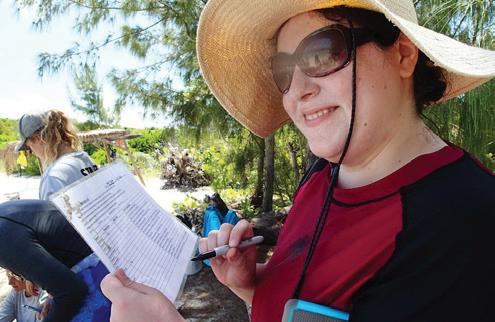
This program is part of a greater effort in the Judy Genshaft Honors College to create opportunities for students interested in sustainability and environmental protection. International engagement allows students to see how other countries approach the impacts of climate change, and allows students of all majors to learn how to incorporate sustainability efforts into their future careers.

Going Abroad
JUDY GENSHAFT HONORS COLLEGE 55
“
... My favorite part of the program was how we were immersed in nature the entire time. ...We were given the opportunity to learn in environments that have little human interaction and impact.”
– Honors Senior Lauren Flannery
PLANTING THE SEEDS FOR A LASTING PARTNERSHIP IN THE Dominican Republic
BY DR. CAYLA LANIER, ASSISTANT DEAN, SARASOTA-MANATEE CAMPUS AND DR. LINDY DAVIDSON, ASSOCIATE DEAN, CURRICULUM AND INSTRUCTION
OVER THE LAST SIX YEARS, nine groups of Judy Genshaft Honors College students have travelled to the Dominican Republic to volunteer in mobile medical clinics under the direction of Dr. Reginald Kerolle and the Kerolle Initiative for Community Health. One of the results of this long-standing partnership is the opportunity for students to build upon the ideas and work of previous groups to increase the impact of our visits for the local communities we serve.
During our Winter 2019 trip, students planted 40 plantain trees in the small community of Valedor in order to improve access to basic and nutritious food staples. In Spring 2022, we helped harvest plantains from the fully grown trees and learned that these plantains were the second harvest; the first had occurred during the height of the pandemic when food was least available. The plantains provided complex carbohydrates and key nutrients to the hundreds of children living in the community.


Ryan Shargo (‘22), a student on the Winter 2019 trip, “returned” to work with Dr. Kerolle through a virtual internship in 2020. He collected and analyzed data from clinical interactions to determine the most prevalent chronic illnesses. He then used his findings to create infographic health education materials that the Spring 2022 group delivered to Dr. Kerolle. Our Fall 2022 group presented these materials in a Community Health Fair to educate community members on preventative measures and at-home treatments for common illnesses.
As co-leaders of this program, we alternate leading the trips while building our curriculum, student projects, and in-country activities upon our shared knowledge and experience of previous trips. We also frequently connect with Dr. Kerolle to determine trending needs in the Dominican Republic to offer just-in-time solutions to emerging issues. Our collaboration is a model for student collaborations, as they continue to build on each others’ ideas over time. Each successive trip to the Dominican Republic allows us to water the seeds of our partnership and continue to bear fruit for our students’ learning outcomes and the community members we serve in the DR.
56 UNIVERSITY of
SOUTH FLORIDA
2019 2022
Going Abroad

JUDY GENSHAFT HONORS COLLEGE 57
EXPLORING Exeter
BY DR. BENJAMIN SCOTT YOUNG, ASSOCIATE DEAN FOR STRATEGIC INITIATIVES & INTERNATIONAL EDUCATION
WHAT HAPPENS WHEN a cohort of Judy Genshaft Honors College students gather and take their diverse aspirations, talents, and disciplinary trainings along on a semester abroad to investigate the foundations of human understanding and well-being? In short, the best of what Honors education has to offer. The Semester in Exeter program combines a traditional study abroad exchange experience with a distinctly Honors interdisciplinary research engagement. During the near 6-month-long spring program, students take courses at the University of Exeter, an esteemed institution of higher education located in southwest of England. It is member of the Russell Group, a consortium of leading universities in the United Kingdom, similar to the American Association of Universities (AAU), and one of the top universities in Europe. Unique to the Honors Semester in Exeter program, however, is the opportunity to travel in a cohort with other Honors students accompanied by USF faculty member and Associate Dean, Dr. Benjamin Scott Young.
In addition to courses at the University of Exeter, students also attend two Honors seminars, each of which is designed to take full advantage of the rich educational and cultural environment that the University of Exeter and England have to offer.

The first course, titled Wander: Food, Field, and Friendship, investigates the basic structures of human understanding utilizing our encounters with, and explorations of, the English culture, landscape, and people as our “studio.”

The second course, titled Flourishing: On Cultivating Persons, Cultures, and Environments of Well-being engages students with the constellation of contemporary ideas, practices, and opportunities for promoting well-being. For this course, we have partnered with the Wellcome Center for Cultures and Environments of Health at the University of Exeter, wherein Honors students have the opportunity to learn alongside world-class engaged research programs that enhance health and well-being from a broadly interdisciplinary frame.
Moreover, both courses offer the opportunity for students to travel together across England, encountering its people, landscape, and history. Centered at the University of Exeter, the program creates a Judy Genshaft Honors College campus abroad that is set at the doorstep of one of the most historically rich, vibrant, and forward-looking intellectual and cultural centers of the contemporary world.
58 UNIVERSITY of SOUTH FLORIDA
Going Abroad


JUDY GENSHAFT HONORS COLLEGE 59
CULTURA E SALUTE: PHYSICIAN OBSERVATION IN Florence
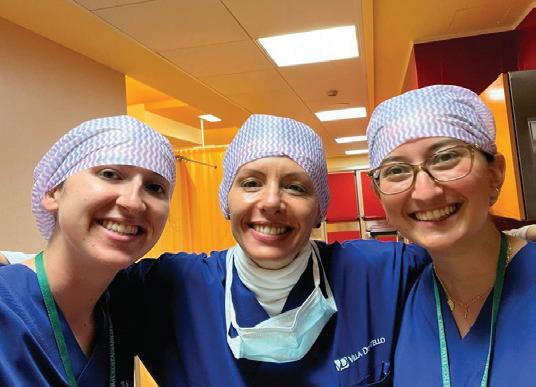 BY ALLYSON COUSINO, HONORS ADVISOR
BY ALLYSON COUSINO, HONORS ADVISOR
DURING THE SPRING 2022 semester, 18 Honors students took IDH 4930 Italian Comparative Health Care, taught by Dr. Janna Merrick. Throughout the course, students gained an understanding of the history of health care in the United States and in Italy, learned of common practices in patient care, and gained cultural and linguistic skills to prepare them for a 4-week study abroad experience in Florence, Italy. In Florence, students put their academic knowledge into practice as they observed surgeries in five hospital and clinical settings throughout the city.
Students had the opportunity to learn directly from worldrenowned surgeons and experienced both public and private hospital settings. Students observed a variety of surgical procedures directly in the operating room, ranging from pediatric neuro surgery, hysterectomies, eye surgeries, tumor removals, and cesarean deliveries. In total, students observed 97 unique surgeries throughout their time in Florence.
In addition to surgical observations, students travelled as a group to Rome where they met with the Secretary of State of the Holy See in the private quarters of the Papal Palace, and visit St. Peter’s Basilica to tour the Vatican Museums. Students went on a tour near the Roman Forum and are pictured above with a Swiss Guard in Vatican City.
The opportunity to learn about the Italian health care system ahead of the trip, combined with in-depth observation and learning, allows students to understand the cultural factors influencing perceptions of health, as well as make comparisons about health care systems as a whole.

60 UNIVERSITY of SOUTH FLORIDA
Going Abroad


JUDY GENSHAFT HONORS COLLEGE 61
“Lantern Festival” - Mandy Chuor

INTERNATIONAL PHOTO COMPETITION

62 UNIVERSITY of SOUTH FLORIDA
“The King’s Palace” - Mandy Chuor
This photo was taken in Hoi An, Vietnam, during an independent research trip to Southeast Asia. The lanterns are part of the town’s historical tradition and belief that they bring good fortune.
This photo was taken in Phnom Penh, Cambodia during an independent research trip to Southeast Asia. Phnom Penh is the capital of Cambodia and the palace featured in this photo belongs to the king himself but also functions as a museum.
Each year, the Judy Genshaft Honors College Student Council hosts an International Photo Competition to support the college’s mission of global exploration and exchange. Students who have travelled abroad in the last year submit their best photos, which are then voted on by the student body. The ten images with the most votes are printed in this magazine, as well as printed on canvas and hung in the Honors College.

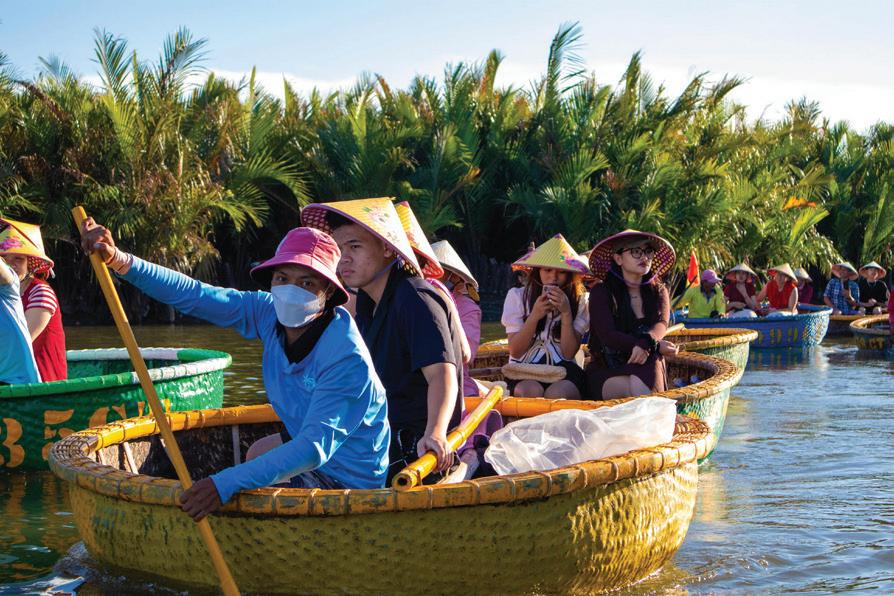
JUDY GENSHAFT HONORS COLLEGE 63
“Coconut Forest” - Mandy Chuor
“The Golden Bridge” - Mandy Chuor
Photo was taken in Hoi An, Vietnam during an independent research trip to Southeast Asia. We glided in a bamboo basket boat which took us through the deepest parts of an extensive coconut forest.
This photo was taken in Đà Nang, Vietnam during an independent research trip to Southeast Asia. The golden bridge is supported by two massive hands emerging from the mountainside of the Bà Nà Hills which soars over 3,000 ft. above sea level.
This image was taken on a Black & White Disposable Kodak Film Camera with a 400 ISO on my way from class to class. It was typical in Florence for there to be street performers in front of the shops and it was always enjoyable to sit and watch everyone having fun.

“What’s a New Home Without a Best Friend?”

In an underground hot chocolate cafe in Budapest, this subject was found among thousands of teddy bears collected by an eccentric older gentleman who took hospitality to another level. Stories flowed from his mouth as he sat at my table from decades of travel and meeting new patrons. The story behind the teddy bear in the image is one of melancholy, left behind by his grandson who went off to university. Although not alone amongst many other bears, it sits there abandoned by its best friend.
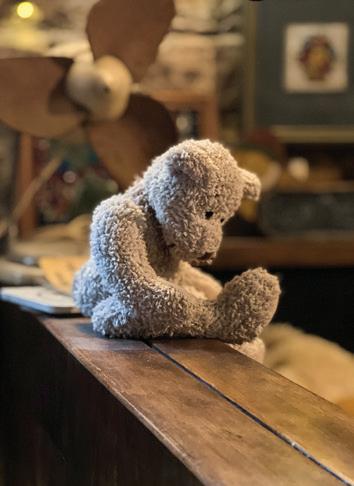
64 UNIVERSITY of SOUTH FLORIDA
“Walk to Class” - Bressia Borja
“Shampan”
- Naziza Naeer Bhuiyan
This is is a traditional type of fishing boat that is commonly used in Chittagong, Bangladesh.
- Caleb Krassner
INTERNATIONAL PHOTO COMPETITION
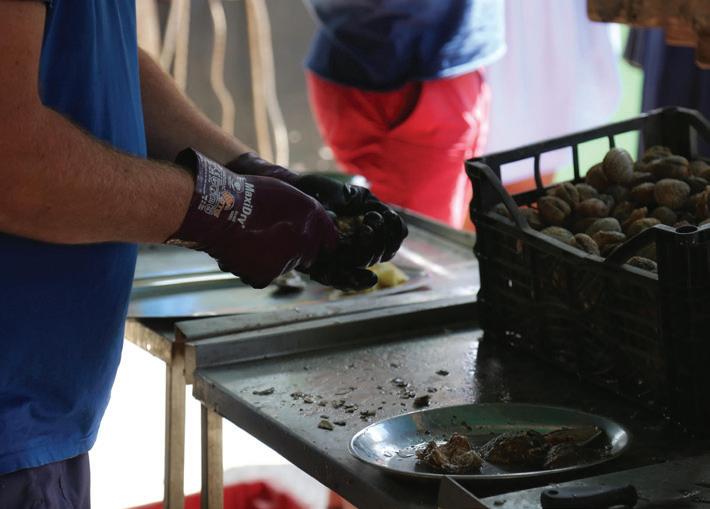

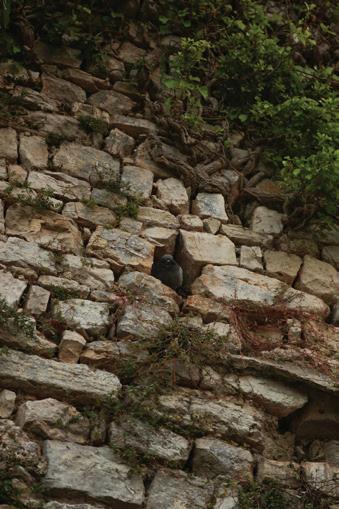
JUDY GENSHAFT HONORS COLLEGE 65 Lynch
“Pigeon Sleeping in the Wall”
- Mykyta Nechaiev
“Dusk” - Naziza Naeer Bhuiyan
“A Man Cuts Oysters”
- Mykyta Nechaiev
I was walking around the city of Porec, Croatia and saw this pigeon sleeping in the crack of the wall.
This is also from the cottage we stayed in in Rangamati with the 180 view of the water taken after sunset.
I was at the fjord in Croatia and there is an oyster farm there and the owner of it was cutting oysters and selling it to people. I took a photo of this beautiful work.
Honors Alumni
Thiago Arzua, PhD, ’16 BA Chemistry, is a Postdoctoral Scientist at Marlin Lab at Columbia’s Mortimer B. Zuckerman Mind Brain Behavior Institute in New York. He studies the neurodevelopmental aspects of how trauma is passed down through generations. Prior to joining Marlin Lab, Thiago completed his doctoral degree in neuroscience at the Medical College of Wisconsin. Outside the lab, Thiago fights for diversity and equity within science, being a co-founder of Black In Neuro, as well as a policy ambassador for the Society for Neuroscience.
Sean Baraoidan, ’16 BS Environmental Science Policy, ’18 MURP, upon graduating with his undergraduate degree, Sean went on to earn his master’s in Urban and Regional Planning from USF. He specialized in coursework around environmental planning, coastal resilience, and creating sustainable communities. Sean is now a Senior Project Manager with REAL Building Consultants where he works as a sustainability consultant for buildings, district-scale developments, and municipalities. Sean is working on the LEED certification for the new Judy Genshaft Honors College building, a project that is very close to his heart. Sean is the current chair of U.S. Green Building Council Tampa Bay and is a co-founder of the Tampa Bay Energy Efficiency Alliance.
Rick Crouse, PhD, ’13 BS Biology, is Program Administrator in Yale University’s Office of New Haven Affairs. Through the Pathways to Science initiative, he works with Yale community members and neighborhood leaders to inspire and empower the next generation of scientists. Rick earned his PhD in Neuroscience from Yale in 2021 by studying the role of acetylcholine signaling in the basolateral amygdala during reward learning. Before graduate school,
he worked for two years at Intezyne Technologies, a USF Incubator Company, developing cancer therapeutics.
Karim Hanna, MD, ’10 BS Biomedical Sciences, ’14 MD, is a Physician and Assistant Professor of Family Medicine at USF Health Morsani College of Medicine. He has received numerous awards for excellence in patient care and now serves as Chief of Family Medicine at Tampa General Hospital. Dr. Hanna joined the USF faculty in 2017, and since then has worked in multiple roles across the medical school’s curriculum. He also taught an elective course in the Honors College on bystander intervention. He is now program director, as he works to develop a Family Medicine res-
idency program to train doctors to serve marginalized populations in Tampa. Most recently, Dr. Hanna received USF’s 2022 Outstanding Young Alumni Award for his professional accomplishments and engagement with the university.


Irene Rita Maragos Hurst, DMD, ’95 BS Biology, ’96 BA Biology, is an orthodontist practicing in the St. Petersburg area. After graduating from USF in ’95 and ’96, she taught middle school math/ science at McLane Middle School in Brandon, FL. She graduated from the University of Louisville School of Dentistry in 2001 with a Doctor of Medical Dentistry as well as a master’s in Oral Biology. Her research focused on dental airline biofilm contamination. In the fall of 2001, Dr. Hurst began a dual program through the Colleges of Medicine and Dentistry. In 2006, she graduated with her Certificate in Orthodontics as well as her Doctor of Philosophy in Biomedical Sciences concentrating in Molecular Cell Biology. Her doctoral research focused on osteoclastic actin ring manipulation and destruction to prevent bone loss. In 2006, Dr. Hurst joined the office of Kaineg, Insoft, and Hurst, now Insoft and Hurst Orthodontics, where she is a partner. She has held numerous positions including presidencies in both the Pinellas County Dental Association as

66 UNIVERSITY
SOUTH
of
FLORIDA
Crouse
Hanna
Hurst
well as the West Coast District Dental Association. She currently serves on the Florida Dental Association House of Delegates and is the Chairperson for the Committee for Dental Education and Licensure.
Tanner Lansdale, ’19 BA Communication, began his Honors College journey as a first time in college admit in the fall of 2015. Originally motivated to join by the college’s Living Learning Community (LLC), he witnessed firsthand how the Honors College embodies a supportive, tight-knit community within the larger environment of USF. An Honors Geographic Perspectives course on Japan encouraged him to study Japanese language at the advanced level while pursuing business-level certification. In 2021 completed an MS in Management from USF’s Muma College of Business. In Fall 2022 he moved into a full-time staff position as the Honors College’s HR Coordinator. He is motivated by the opportunity to give back to a community that has invested so much into him –students, faculty, and staff alike.
ing on industrial partnership programs in India, Oman, and Europe. After seeing a major gap and inequity in the beauty industry for accessible and high-quality makeup and skincare, Megan left LM to found SIIA Cosmetics in 2020, the first truly inclusive Korean beauty brand in the world. There, Megan leads branding, business development, and strategic planning. SIIA is carried in hundreds of stores throughout the US, Canada, and is entering the Caribbean and Central America, as well as launching into major retailers. Megan lives in Texas with her husband and dog.

transnational feminism and food studies. Farha received her PhD in Sociology of Gender from Loyola University in Chicago. She will be on sabbatical from 2023-2024 where she will be heading to Boston University as a visiting scholar and instructor.
Megan Rein, ’12 BA International Studies, completed her Master of Science from the London School of Economics in International Development. She worked for seven years in International Program Management at Lockheed Martin focus-

Farha Ternikar, PhD., ’93 BA Professional-Technical Writing, ’98 MA Religious Studies, ’98 MLA, is the Director of Gender and Women’s Studies at Le Moyne College in Syracuse, New York. She was recently promoted to full professor of Sociology in spring 2022. Farha is the first woman of color to be promoted to full professor in the Social Sciences at Le Moyne College. In December of 2021, she published her second book, “Intersectionality in the Muslim South Asian-American Middle Class: Lifestyle Consumption beyond Halal and Hijab”, and “Beyond Hijab and Modest Fashion” in the Journal of Fashion Studies. Her first book was featured on NPR, and she is currently working on a third book project with Dr. Stephanie Evans on

Jessica Zelitt, ’19 BS Public Health, entered Stetson University College of Law in Gulfport, Florida, after graduation. In 2021, Jessica had an article selected for publication in Stetson Law Review, entitled “Pay or Die: Evaluating the United States Insulin Pricing Crisis and Realistic Solutions to End It,” which used her public health knowledge and research skills learned while studying at USF. In May of 2022, Jessica graduated with her Juris Doctor, and was named Valedictorian of her law school class. She now works as an attorney at Adams and Reese, LLP in Sarasota, Florida.
ATTENTION HONORS ALUMNI
We want to stay connected with you! Please email us at alumni@honors.usf.edu with your updated contact information and any news you’d like to share. We are proud of our alumni and want to promote your accomplishments.
JUDY GENSHAFT HONORS COLLEGE 67 ALUMNI
Rein
Ternikar
Zelitt


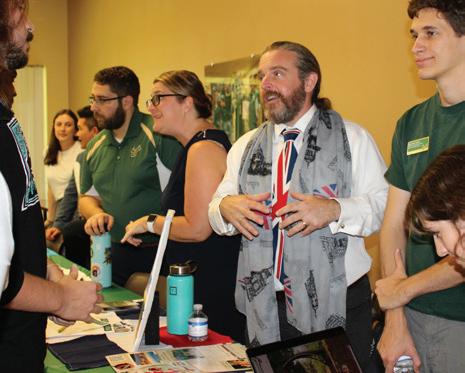

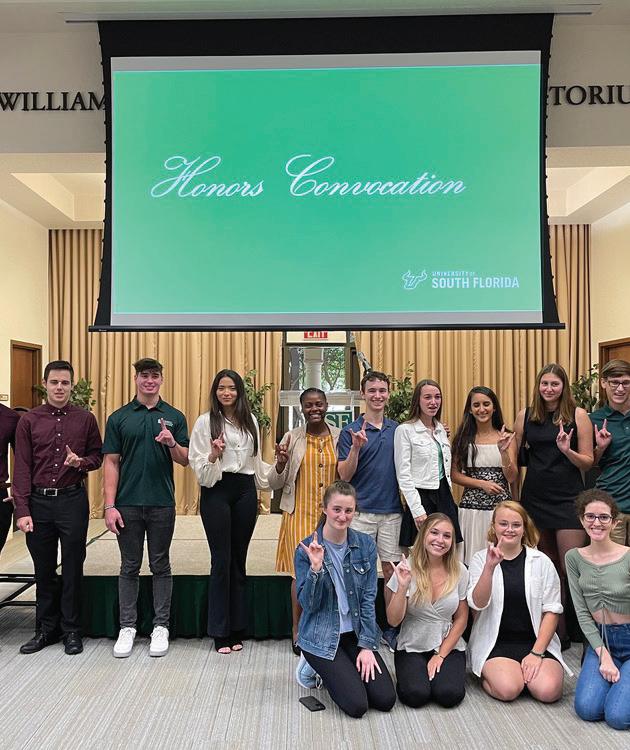
68 UNIVERSITY of SOUTH FLORIDA
JUDY GENSHAFT HONORS COLLEGE Directory
ADMINISTRATION:
Charles Adams, Ph.D.
Judy Genshaft Endowed Dean Professor of English
With Honors Since 2014 chadams@usf.edu
Lindy Davidson, Ph.D. Associate Dean for Curriculum & Instruction, Tampa campus Associate Professor of Instruction With Honors Since 2016 lindyd@usf.edu
Cayla Lanier, Ph.D. Assistant Dean, Sarasota-Manatee campus
With Honors Since 2008 cclanier@usf.edu
Reginald Lucien, Ph.D.
Assistant Dean for Student Success
With Honors Since 2006 lucien@usf.edu
Thomas Smith, Ph.D. Associate Dean, St. Petersburg campus
With Honors Since 2005 twsmith2@usf.edu
Benjamin Scott Young, Ph.D.
Associate Dean for Strategic Initiatives & International Education Associate Professor of Instruction
With Honors Since 2008 bsyoung2@usf.edu
ADVISORS:
Krysta Banke, Ph.D. Honors Advisor, Tampa campus
With Honors Since 2015 krystabanke@usf.edu
Al Blanchard, Ph.D. Honors Advisor, Tampa campus
With Honors Since 2022 blancharda@usf.edu
Megan Braunstein, M.Ed. Honors Advisor, Tampa campus With Honors Since 2014 mbraunstein@usf.edu
Allyson Cousino, M.Ed. Honors Advisor, Tampa campus
With Honors Since 2020 acousino@usf.edu
Carter Harbert, M.Ed. Honors Advisor, Tampa campus With Honors Since 2016 harbert@usf.edu
Kevin Lee, M.A. Honors Advisor, Tampa campus With Honors Since 2020 clee24@usf.edu
Arnaldo Mejias, M.A. Director of Advising With Honors Since 2005 amejias@usf.edu
Audra Santerre, M.Ed. National Merit Scholars Coordinator With Honors Since 2021 audrabegg@usf.edu
Dani Soluna, M.Ed. Honors Advisor, St. Petersburg campus With Honors Since 2017 dsoluna@usf.edu
FACULTY:
Michael Cross, Ph.D. Associate Professor of Instruction With Honors Since 2016 mcross5@usf.edu
Andrew Hargrove, Ph.D. Assistant Professor of Instruction With Honors Since 2021 awhargrove@usf.edu
Tina Piracci, M.S. Honors Instructor With Honors since 2022 tpiracci@usf.edu
Atsuko Sakai, M.Arch. Associate Professor of Instruction With Honors Since 2016 asakai@usf.edu
Ulluminair Salim, Ph.D. Associate Professor of Instruction With Honors Since 2017 usalim@usf.edu
Holly Donahue Singh, Ph.D. Associate Professor of Instruction With Honors Since 2017 hdsingh@usf.edu
Catherine Wilkins, Ph.D. Associate Professor of Instruction With Honors Since 2015 cjwilkins@usf.edu
PROFESSIONAL STAFF:
Joan Field Assistant to the Dean Academic Services Administrator With Honors Since 2005 field@usf.edu
Cathy Hsieh
Fiscal Director With Honors Since 2010 khsieh@usf.edu
Judy Kane Director of Development With Honors Since 2005 kane@usf.edu
Tanner Lansdale
Unit HR Coordinator and Records Coordinator With Honors Since 2016 lansdalet@usf.edu
Hayden Mitchell
Advancement Administrator
With Honors Since 2020 mitchelh@usf.edu
Marco Nardiello Advancement Administrator
With Honors Since 2012 marcon@usf.edu
Joey Sousa Admissions Coordinator
With Honors Since 2021 sousa@usf.edu
Dana Taylor Director of Communications and Marketing With Honors Since 2022 drtaylor1@usf.edu
Dan Woods Student Engagement Coordinator, Tampa Campus With Honors Since 2022 danielwoods2@usf.edu
PROVOST’S SCHOLARS PROGRAM: Renea Forde, M.A. Director, Provost’s Scholars Program With Honors Since 2019 rforde@usf.edu
OFFICE OF NATIONAL SCHOLARS:
Sayandeb Basu, Ph.D.
Director, Office of National Scholars With Honors Since 2016 sayandeb@usf.edu
Lauren Chambers, M.P.H
Associate Director, Office of National Scholars With Honors Since 2008 lschumac@usf.edu
Lauren Roberts, M.Ed. Assistant Director, Office of National Scholars With Honors Since 2016 robertsl1@usf.edu
JUDY GENSHAFT HONORS COLLEGE 69
Honors Courses
OFFERED IN 2022
Each year the Judy Genshaft Honors College accepts hundreds of course proposals from faculty across the university, the broader Tampa Bay community, and even other countries. While our courses are grouped by disciplines within the liberal arts tradition, each professor brings their unique spin on the category, offering a one-of-a-kind learning opportunity for our students. Included below is a list of all courses offered in the Judy Genshaft Honors College in 2022.
IDH 3100: ARTS AND HUMANITIES

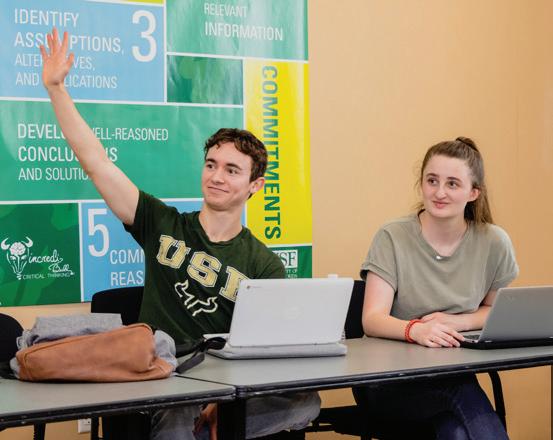
100 Days of Discovery: Cultivating Your Curiosity and Finding Relevance - Francesca Arnone-Lewis
All the World’s a Stage: Performing the Self and Culture - David Jenkins
Art in Motion - Tina Piracci
Arts and Health at the Ringling Museum of Art - Catherine Wilkins
Community Mural Creation - Carolina Miles
Creator, Images, and Sounds - Tamara Nemirovsky
Ecopoetry and Environmental Writing - Derek Robbins
“Fight the Power”: Of Politics, Protest, Resistance, and Popular Music - Angsumala Tamang
Gender Performance on the Tragic Stage - Simon Dutton
“Gotta Dance”: The Greatest Dancers - Jeffrey Donley
Hands-On History at Largo’s Heritage VillageCatherine Wilkins
History by Hollywood: Telling American Stories at the Movies - Jason Vickers
Interpreting Marvel’s Avengers - Kevin Yee
Narrative Cartography: Mapping the Stories of Your Life - Ulluminair Salim
Narrative Medicine and Health In/Justice - Brianna Cusanno
Pilgrim in the Metaverse: Exploring Virtual RealityCsaba Osvath
Refined Imaginations: A Poetry Workshop - Deepak Singh
Rock’n’Roll: The Music of a Generation - Calvin Falwell
Shakespeare and the Enlightenment: His Life, His Work, His Time - David Garrison
Stop Motion Animation - Tamara Nemirovsky
70 UNIVERSITY of SOUTH FLORIDA
Above: Courses on the Sarasota-Manatee campus have 10-12 students and focus on areas of expertise specific to the campus, including hospitality and health humanities.
Opposite Page: Students on the St. Pete campus take Honors Thesis with Associate Dean Thomas Smith, and meet frequently in the historic Williams House conference room to share their progress.
The Afterlife in the Ancient World - Jeffrey Donley
The Fear of Difference in U.S. Horror Film - Colin Whitworth
The Rise of EDM: A History of Electronic Music - Calvin Falwell
Travel Writing and Literature - Deepak Singh
Writing Resistance: Poetry and Fiction against OppressionDennis Mont’Ros
When Your Legs Don’t Work Like They Used to Before… Aging and Popular Music - Adam Davidson
IDH 3350: NATURAL SCIENCES
Climb Every Mountain (Or Just Admire the Landscapes) - Judy McIlrath
Interdisciplinary Research in Science: The Laboratory of LifeMichael Cross
Marine Life and Habitats - Teresa Greely
Microorganisms, Disease, and Host Responses - Steven Specter
Natural Hazards of the Earth’s Surface (And Why Most are Human-Caused) - Timothy Dixon
What is the Environment? - Andrew Hargrove
IDH 3400: SOCIAL AND BEHAVIORAL SCIENCES

Careers and Working Life - Amaly Santiago
Common Goods: Exploring Shared Resources and Public SpacesCody Hawley
ACADEMICS
Emotions: Experience, Expression, and Understanding - Lisa Spinazola
Environmental Economics - Rebecca Harris Barancik
Equipment for Living: Popular Culture and Social Change - David Jenkins
Fertility and the Future - Holly Donahue Singh
Food and History - Gary Mormino
Food, Migration, and Globalization: The American Melting PotDavid Jenkins
Germany: Beyond the Classroom - Peter Funke
Global Health with People First - Holly Donahue Singh
Music Mania: The Psychology of Music - Jeffrey Donley
Political Polarization and Reconciliation - Patrick Casey
Post-World War II History and the Concurrent Evolution of Television - Daniel Ruth
Protest, Diversity, and Oppression in Music - Francesca Arnone
RBG’s Legacy: Examining Women’s Rights in the Workplace and at Home - Bonnie Silvestri
Rediscovering Disney: A Critical Investigation - Erin Gough
Text, Tweet, Take to the Street: The First Amendment - Kirsten Davis
Truth in a “Post-Truth” Era - Patrick Casey
What’s Your Number? The Mathematic and Cultural Associations of Numbers - Laura Szalacha
Women and Leadership Discourse - Amaly Santiago
JUDY GENSHAFT HONORS COLLEGE 71
IDH 3600: SEMINAR IN APPLIED ETHICS
Authoritarianism, Policing, and Civil Disobedience - Gregory McCreery
Biomedical Ethics - John Dormois
Building the Future: Environmental and Technological Transformations - Gregory McCreery
Citizen Walkers - Adam Davidson
Controversies in Medical Research - David Diamond
Corporate Personhood: Identity and Responsibility - David Garrison
Environmental Ethics: Who is Responsible, to Whom, and Why?David Garrison
Ethics at the End of Life - Brianna Cusanno
Moral Machines? The Social Impacts of Artificial Intelligence - Ora Tanner
Physicians of the Soul: Medicine, Philosophy, and the Good Life –Benjamin Young
The American Revolution: Ethics in a Time of World War, 1776Jeffrey Donley
The Ethics of Political Grievances, Freedom, and the Response to Tyranny - Stephanie Williams
The Ethics of Visual Rhetoric - Meredith Johnson
The Power of One: Ethics in 19th Century Literature - Jeffrey Donley
The Whitewashing of Black Music - Calvin Falwell
IDH 4200: GEOGRAPHICAL PERSPECTIVES
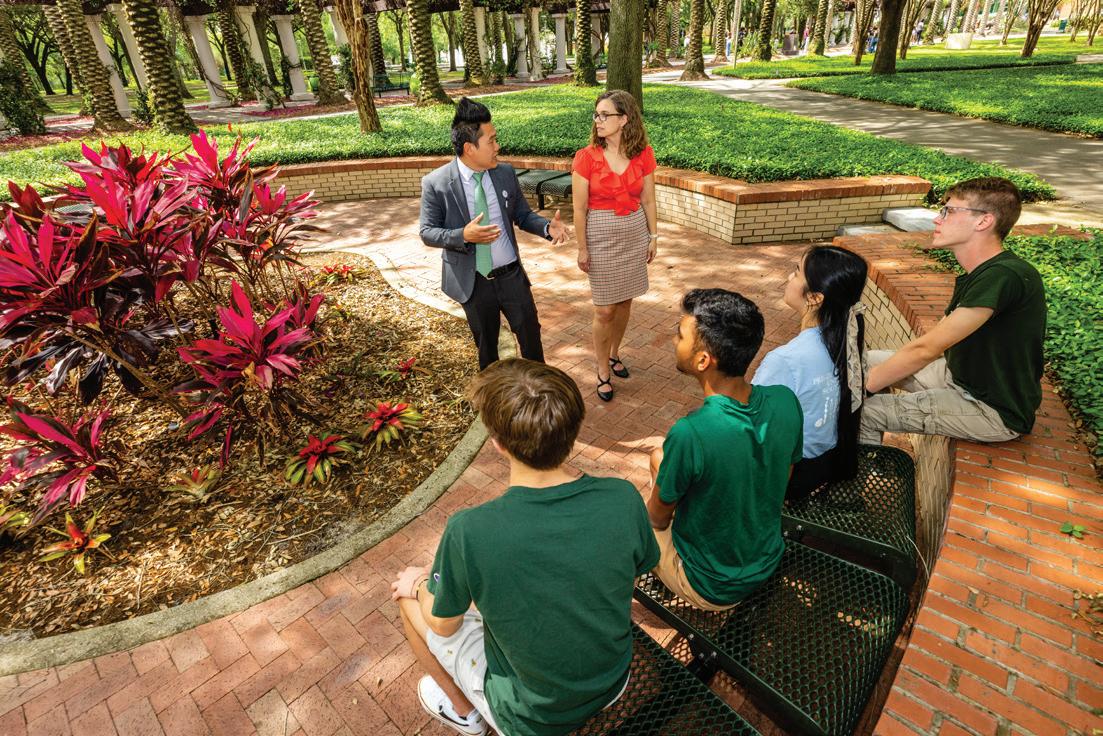
1968 - A Year Unlike Any Other - Daniel Ruth
Access to Justice - Alma Dedic Sarenkapa
Arab Literature, Culture, and Film - Raja Benchekroun
Beasts and Burdens: Survival, Imagination, and Risk in the (Global) South - Ulluminair Salim
Bollywood: Nation, Desire, and Modernity Through Sounds and Images of Indian Cinema - Angsumala Tamang
Collaborative Service-Learning in Ghana: Transforming Spectators into Problem-Solvers - Elizabeth Doone
Contemporary Middle East - Nazek Jawad
Experience Japan - from Hospitals to Hospitality (Omotenashi)Atsuko Sakai
Food and Culture in the Arab and Eastern World - Raja Benchekroun
French Revolution (1789-1794) and Iran Islamic Revolution 1979: A Comparative Perspective - Parandoosh Sadeghinia
Gender and Politics in Southeast Asia - Brian Turnbull
(Global)2 Perspectives of Health: Exploring Components of Holistic Health in the Global North and South - Lydia Asana
Global Constructions of (Dis)Ability - Lindy Davidson
Global Health is Local Health - Lydia Asana
Global Perspectives of Financialization - Olubukola Olayiwola
Global Perspectives: Politics, Literature, and Film - Thomas Smith
Healing and Everyday Crises in South Asia - Holly Donahue Singh
72 UNIVERSITY of SOUTH FLORIDA
Health and Culture in the Dominican Republic: Beyond the Classroom - Lindy Davidson
Health and History - Andrea Vianello
How to Save a Planet: Individual Action and Systemic Solutions - Andrew Hargrove
London Walk: Explorations of Time and Place – Benjamin Young
Organizational Culture and International Perspectives - Amaly Santiago
Sectarianism and Terrorism in the Middle East: From Afghanistan to Lebanon - Arman Mahmoudian
Socio-political Developments in the New Russia - Arman Mahmoudian
South Korean Culture and Society: Beyond the ClassroomKevin Lee and Ky Pontious
Sub-Saharan Africa - Fenda Akiwumi
The Long-lasting Struggles of Arab Middle East: From the Fall of the Ottoman Empire to the Dawn of Arab Spring - Arman Mahmoudian
The Politics of the Russian Federation: Form the Second Chechnya War to the Invasion of Ukraine - Arman Mahmoudian
The Russian Invasion of Ukraine: Implications for Russia and the World - Arman Mahmoudian
UN Sustainable Development Goals and Global CompetenciesParandoosh Sadeghinia
Wander: Perception, Understanding, and Improvisation –Benjamin Young
Women in Conflicts in the World - Raheleh Dayerizadeh
IDH 4930: SPECIAL TOPICS IN HONORS
Global Politics – Rep. Gus Bilirakis
Honors Seminar in Pharmacy - Yashwant Pathak
Identity, Democracy, and Citizenship in the Evolving
International Order – Rt. Hon. Henry McLeish
IDH 4950: HONORS CAPSTONE
Becoming the Next Problem Solver: Creator, Thinker, Changemaker - Michael Cross
Civic Literacy and Current Events - Dan Ruth
Connections: Mental Healthcare, Community Engagement, and Art - Catherine Wilkins
Connections: Mental Healthcare, Community Engagement, and Art - Ulluminair Salim
Contemporary Art Museum Co-Lab - Leslie Elsasser
Digital Video Production - Reginald Lucien
Du Bois Data Portraits Remix: Reimagining Black Life in America
- Andrew Hargrove
Exploring Behind the Veil: The New Honors Building - Atsuko Sakai
Flourishing: Cultivating Persons, Cultures, and Environments of Well-being – Benjamin Young
Let Me Tell You A Story: Creative Writing - Daniel Ruth
Perspectives in Performing Arts Healthcare - Nancy Burns
Policy-making and Contemporary Governance - Belisa Marochi
Quality makes ¢ent$: Healthcare Research & Quality OutcomesDonna Ettel Gambino
Reproductive Health, Rights, and Justice - Holly Donahue Singh
Systems Thinking for Sustainability - Kebreab Ghebremichael
Transitional Justice - Alma Dedic Sarenkapa
Visual Narratives - Tamara Nemirovsky
Writing Craft: Telling Your Story - Deepak Singh
Opposite Page: Dr. Hargrove and Dr. Davidson make use of the butterfly garden on the Tampa campus to get students outside while discussing how they can engage in sustainable action for the environment.
Left: Dr. Salim’s teaching style engages students’ hearts and minds as they work on class projects of personal significance.

JUDY GENSHAFT HONORS COLLEGE 73
Admission TO THE JUDY GENSHAFT HONORS COLLEGE
The University of South Florida Judy Genshaft Honors College provides USF students with the opportunity to expand on their academic interests, while simultaneously building an inclusive, supportive community with their peers, faculty, and administration. The Judy Genshaft Honors College is available to students of all majors, and all three USF Campuses. Our incoming freshman class comprises just over 700 seats for students across our Tampa, St. Petersburg, and Sarasota-Manatee campuses.
Students are eligible to apply for the Judy Genshaft Honors College after submitting their admissions application to USF and activating their USF NetID. The application requirements include a short essay and a list of involvement in extracurricular activities. Applications are

reviewed holistically, using the submitted information in conjunction with a student’s academic profile.
We also offer automatic acceptance to select prestigious award recipients, including National Merit Scholarship and College Board National Recognition programs. Please review our website using the QR code above for further details, including our deadlines and decision release dates.
We are excited to have you join us and we invite you to apply. Connect with us via email at contactus@honors.usf.edu. You can request tours and virtual information sessions led by Honors Student Ambassadors online at signup.usf.edu/honors.

74 UNIVERSITY of SOUTH FLORIDA
Social Media
Follow us on Instagram and tag us to see your photos shared in a future issue!



Instagram:
@usfhonors
@usfsphonorscollege

@usfsmhonorscollege



@usfjghcsc for all the events
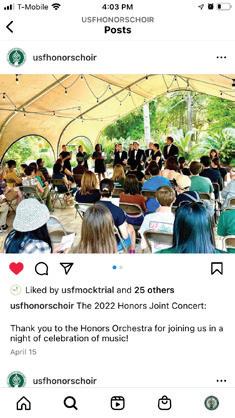
JUDY GENSHAFT HONORS COLLEGE 75 SPOTTED ON
Judy Genshaft Honors College


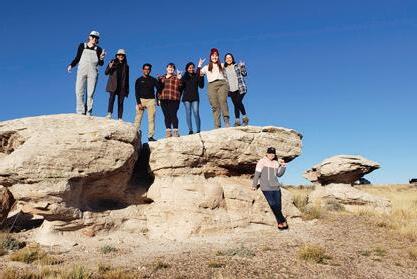

The Judy Genshaft Honors College is located online at usf.edu/honors and physically on all three USF campuses.



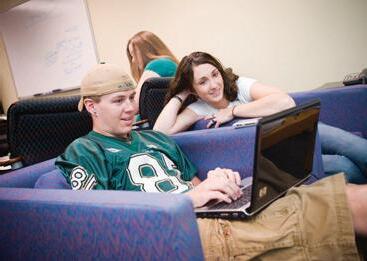




Tampa: 4202 E. Fowler Ave., HON 1001

Tampa, FL 33620
(813) 974-3087
St. Petersburg: 140 Seventh Avenue South, SNL 100



St. Petersburg, FL 33701

(727) 873-4583
Sarasota-Manatee:
8350 N. Tamiami Trail, C129 Sarasota, FL 34243
(941) 359-4495

























































 BY KY PONTIOUS, INTERNATIONAL STUDIES, CLASS OF ‘19
BY KY PONTIOUS, INTERNATIONAL STUDIES, CLASS OF ‘19















 BY DR. CAYLA LANIER, ASSISTANT DEAN, SARASOTA-MANATEE CAMPUS, CLASS OF ‘03
BY DR. CAYLA LANIER, ASSISTANT DEAN, SARASOTA-MANATEE CAMPUS, CLASS OF ‘03


















































 BY CARTER HARBERT, HONORS ADVISOR
BY CARTER HARBERT, HONORS ADVISOR
















 BY LAUREN ROBERTS, ASSISTANT DIRECTOR, OFFICE OF NATIONAL SCHOLARS
BY LAUREN ROBERTS, ASSISTANT DIRECTOR, OFFICE OF NATIONAL SCHOLARS









 BY ALLYSON COUSINO, HONORS ADVISOR
BY ALLYSON COUSINO, HONORS ADVISOR





















































































